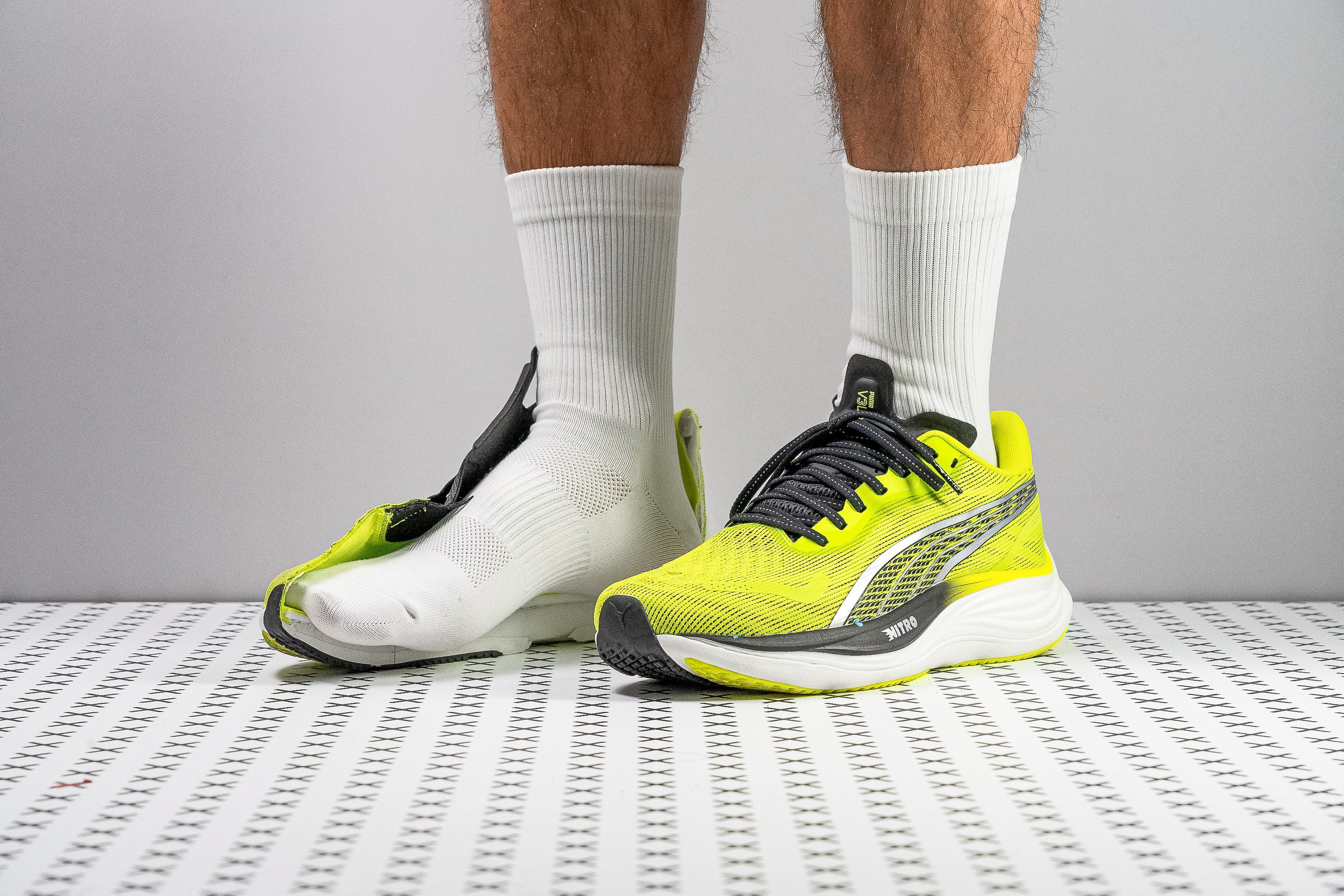Our verdict
Pros
- Versatile performance
- Outstanding grip
- Superb value for money
- Suitable for long distances
- Comfortable daily wear
- Reliable durability
- Natural running feel
- Natural running feel
Cons
- Narrow toebox
- Firmer EVA carrier foam
- Thin tongue
- Not responsive enough
Audience verdict
Comparison
The most similar running shoes compared
+ + Add a shoe | |||||
|---|---|---|---|---|---|
| Audience score | 86 Good! | 88 Great! | 92 Superb! | 90 Superb! | |
| Price | £110 | £80 | £120 | £110 | |
| Pace | Daily running | Daily running | Daily runningTempo | Daily runningTempo | |
| Shock absorption | Moderate | Moderate | High | High | |
| Energy return | Moderate | Low | High | Moderate | |
| Traction | High | High | High | High | |
| Arch support | Neutral | Neutral | Neutral | Neutral | |
| Weight lab Weight brand | 9.3 oz / 264g 9.5 oz / 269g | 9.2 oz / 261g 9.3 oz / 263g | 7.9 oz / 224g 8.6 oz / 245g | 8.6 oz / 245g 8.4 oz / 238g | |
| Lightweight | ✗ | ✗ | ✓ | ✓ | |
| Drop lab Drop brand | 9.3 mm 10.0 mm | 6.0 mm 6.0 mm | 9.7 mm 10.0 mm | 8.2 mm 9.0 mm | |
| Strike pattern | HeelMid/forefoot | Mid/forefoot | HeelMid/forefoot | HeelMid/forefoot | |
| Size | True to size | True to size | True to size | Half size small | |
| Midsole softness | Soft | Balanced | Balanced | Balanced | |
| Difference in midsole softness in cold | Small | Small | Big | Small | |
| Toebox durability | Decent | Bad | Decent | Bad | |
| Heel padding durability | Good | Decent | Decent | Good | |
| Outsole durability | Decent | Good | Decent | Decent | |
| Breathability | Moderate | Breathable | Moderate | Breathable | |
| Width / fit | Medium | Medium | Medium | Wide | |
| Toebox width | Narrow | Medium | Medium | Medium | |
| Stiffness | Moderate | Stiff | Flexible | Moderate | |
| Torsional rigidity | Moderate | Stiff | Flexible | Moderate | |
| Heel counter stiffness | Moderate | Moderate | Moderate | Flexible | |
| Heel lab Heel brand | 34.8 mm 36.0 mm | 32.7 mm 29.0 mm | 33.7 mm 36.0 mm | 34.9 mm 35.0 mm | |
| Forefoot lab Forefoot brand | 25.5 mm 26.0 mm | 26.7 mm 23.0 mm | 24.0 mm 26.0 mm | 26.7 mm 26.0 mm | |
| Widths available | NormalWide | Normal | NormalWide | NormalWide | |
| Orthotic friendly | ✓ | ✓ | ✓ | ✓ | |
| Season | All seasons | SummerAll seasons | All seasons | SummerAll seasons | |
| Removable insole | ✓ | ✓ | ✓ | ✓ | |
| Ranking | #409 Bottom 40% | #139 Top 37% | #10 Top 3% | #48 Top 13% | |
| Popularity | #277 Top 41% | #295 Bottom 22% | #58 Top 16% | #180 Top 47% |
Who should buy
We're convinced that the Velocity Nitro 3 is a stellar choice for:
- Runners seeking a versatile, neutral daily trainer that offers exceptional value.
- Those who alternate between asphalt or concrete and dirt roads, thanks to the outstanding PumaGrip outsole.
- Fans of the previous Velocity Nitro versions, as the latest iteration retains the successful formula while enhancing its main features.
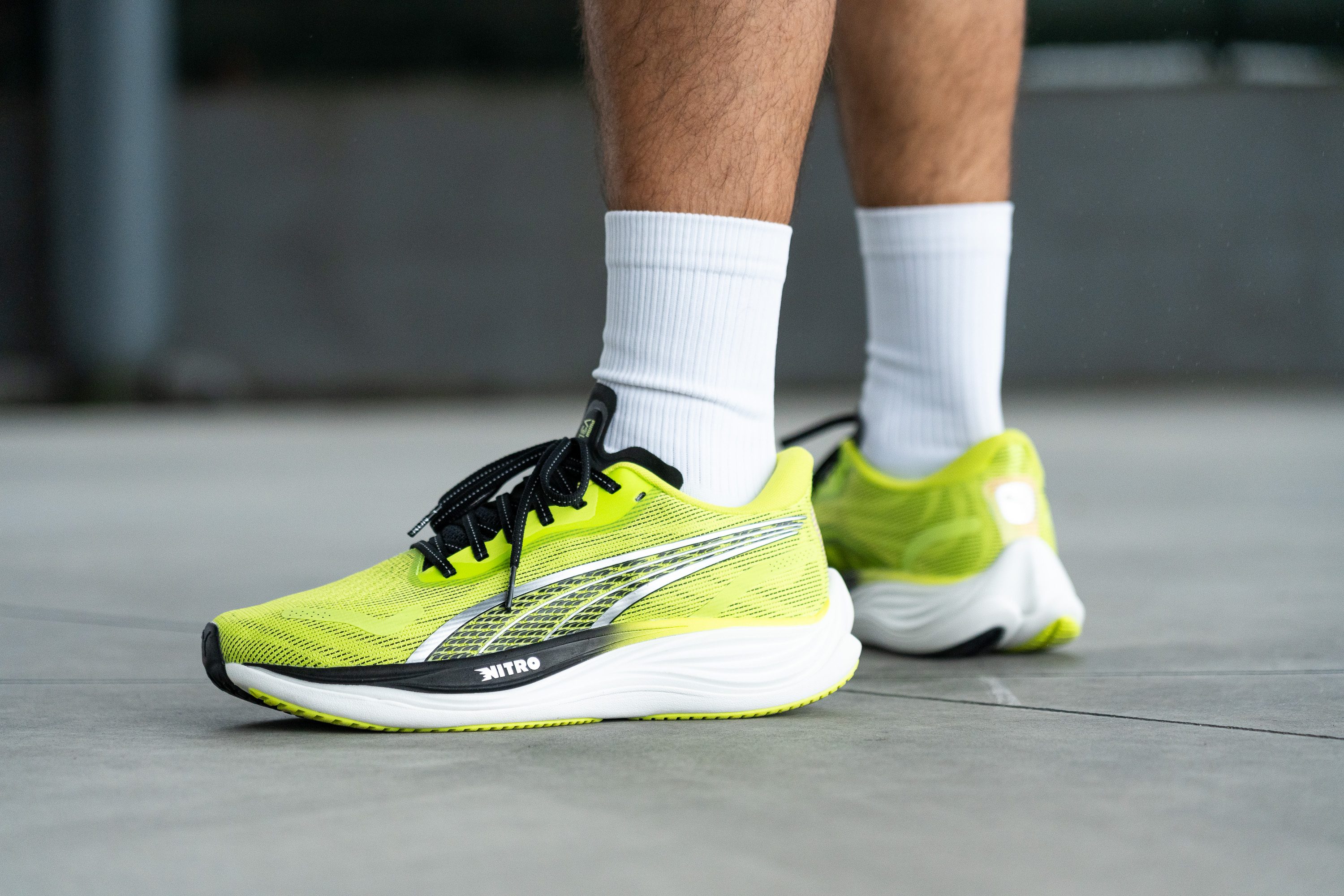
Who should NOT buy
After putting the Velocity Nitro 3 through its paces in our lab, we've identified a few scenarios where it might not be the optimal choice for certain runners.
For forefoot or midfoot strikers looking for a shoe with less drop, we think the Hoka Clifton 9, with its excellent value and cushioning, would be a better fit.
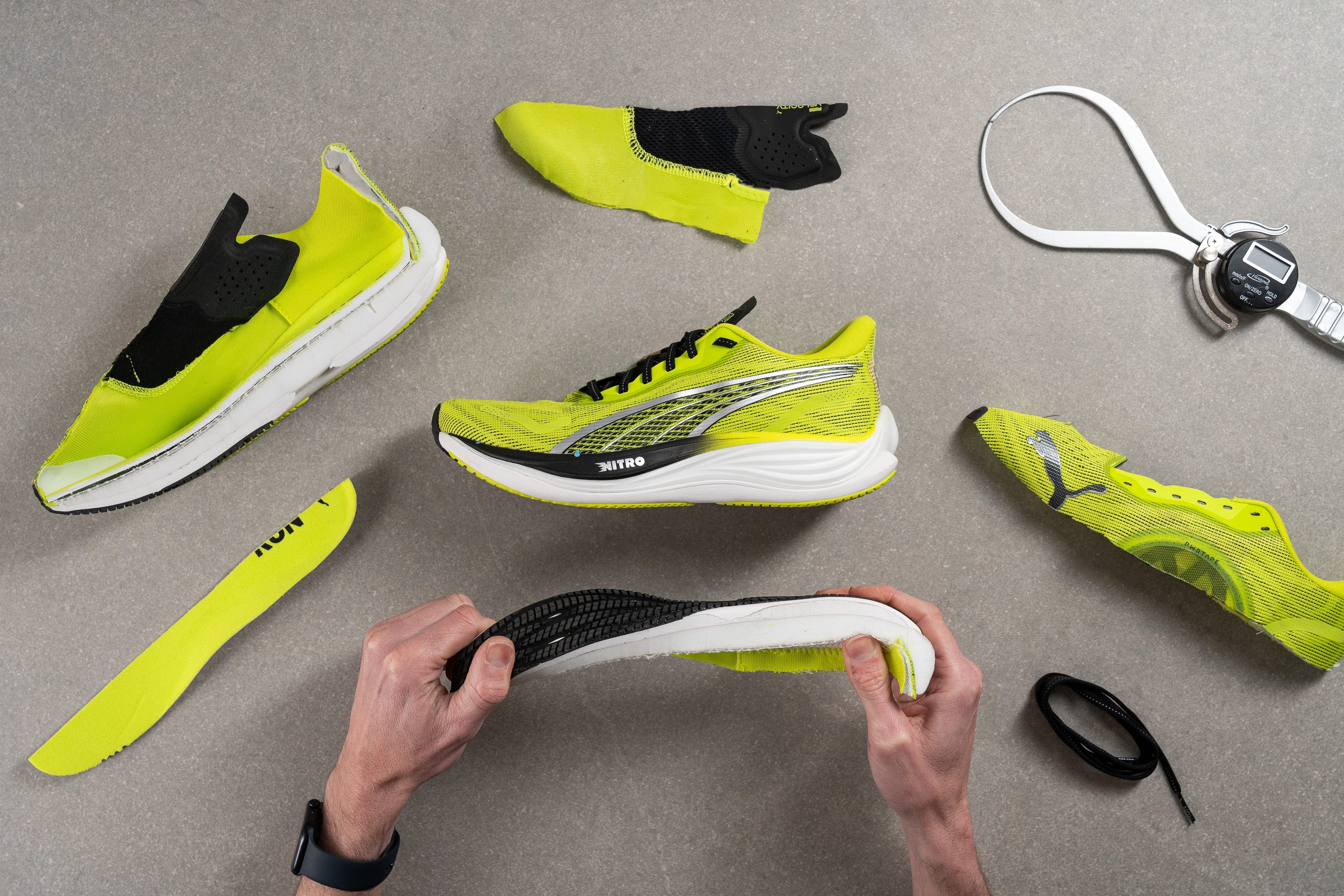
Furthermore, we believe the forefoot width of the Velocity Nitro 3 could be more generous. For those who thrive in wider shoes, the ASICS Novablast 4 presents a similar price but boasts a significantly larger forefoot area, ensuring more secure landings.
Cushioning
Shock absorption
Shock absorption earns a solid nod from us, though the Velocity Nitro 3 isn’t built for max-cushion seekers. Instead, it delivers just-right protection for the average runner with a respectable 127 SA reading.
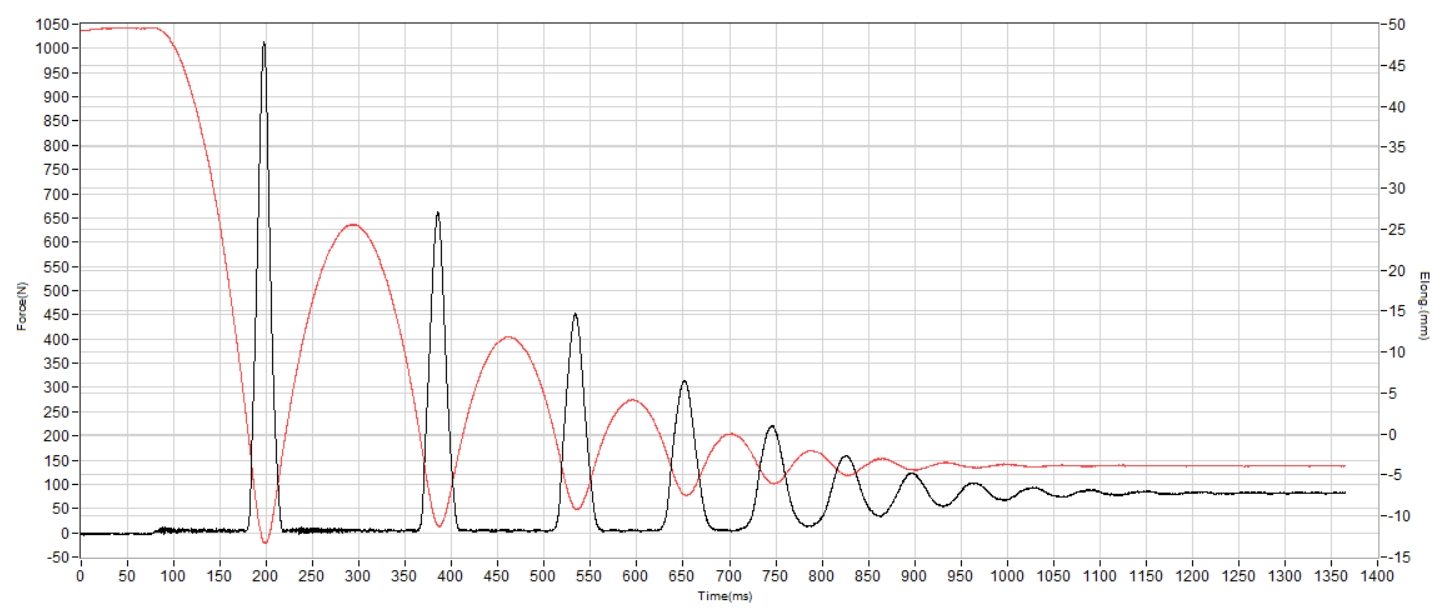
| Velocity Nitro 3 | 127 SA |
| Average | 130 SA |
Energy return
While the Velocity Nitro 3 uses a firmer EVA blend that feels slightly less springy than Puma’s usual Nitro foam, we found in the lab that energy return still reached 56.2%—very close to the brand’s average for daily trainers.
And that confirms why testing shoes under controlled conditions remains the most reliable and unbiased way to compare different models.
| Velocity Nitro 3 | 56.2% |
| Average | 58.6% |
Heel stack
This daily trainer hits the mark in so many aspects, and its stack height is no exception.
At 34.8 mm, it might not fall into the maximalist category by current standards, yet it offers ample cushioning in the rearfoot to accommodate every runner, including those on the heavier side.
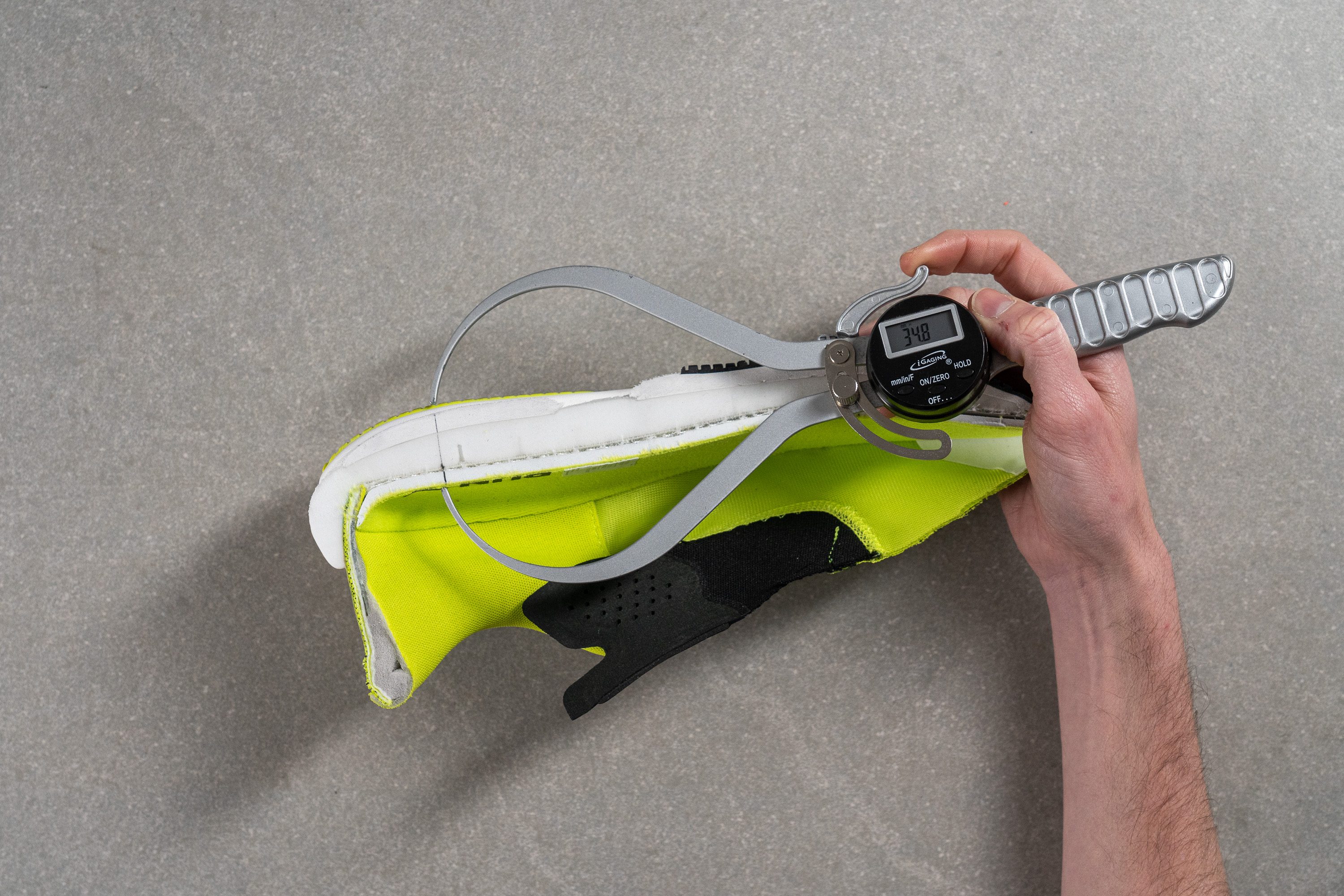
| Velocity Nitro 3 | 34.8 mm |
| Average | 34.8 mm |
Forefoot stack
The forefoot maintains a consistent theme in design and execution, presenting a standard stack at 25.5 mm. It performs adequately, suitable for a wide range of users, and strikes a balanced height that avoids extremes.
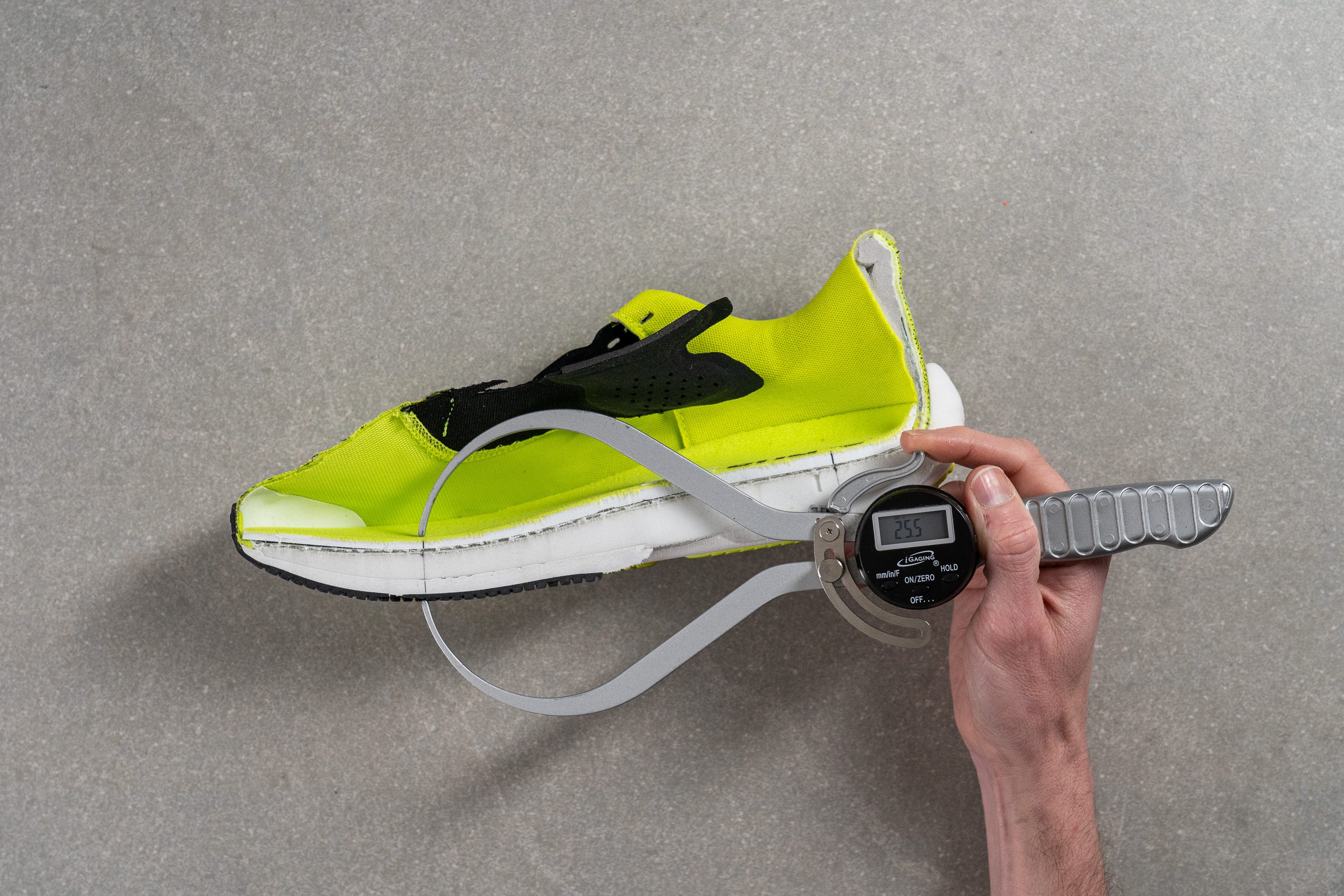
| Velocity Nitro 3 | 25.5 mm |
| Average | 26.2 mm |
Drop
Calculating the difference from our previous two measurements yielded a 9.3-mm heel-to-toe drop, which leans towards the higher end and may particularly benefit heel strikers, though it's versatile enough for any runner.
This figure slightly deviates from the official 10-mm specification, but the discrepancy is minimal. In our experience, it's common to encounter more significant variances.
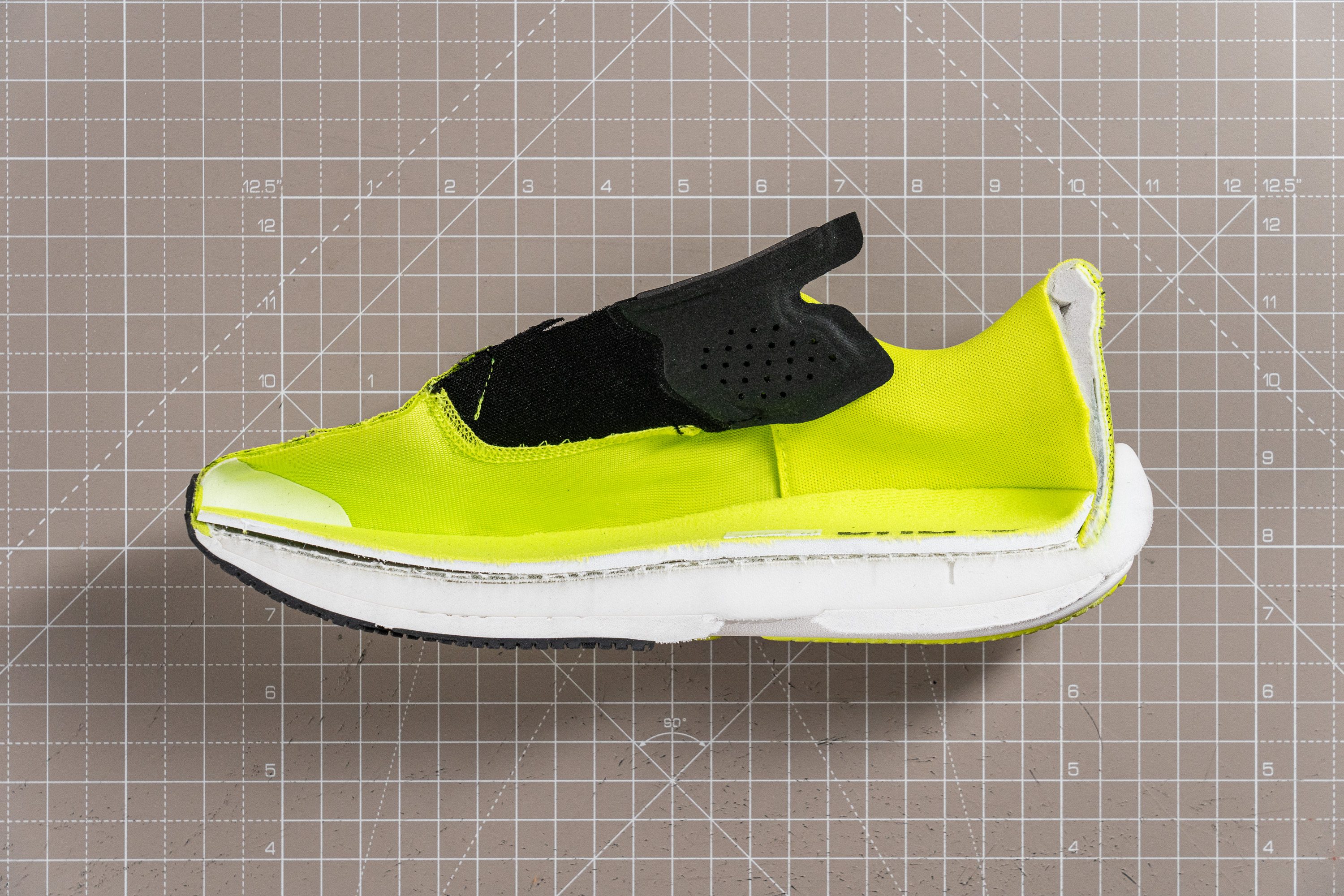
| Velocity Nitro 3 | 9.3 mm |
| Average | 8.6 mm |
Midsole softness
Transitioning to the midsole, the Velocity Nitro 3 showcases a dual-foam setup. The main foam—and the one closer to the foot—is the tried-and-true Puma Nitro foam, a supercritical blend that impresses us with its lightweight yet resilient nature.
Our durometer reading of 17.9 HA confirmed the midsole's ability to provide a plush yet not overly soft ride, striking a balance that benefits comfort yet prevents the sensation of bottoming out.
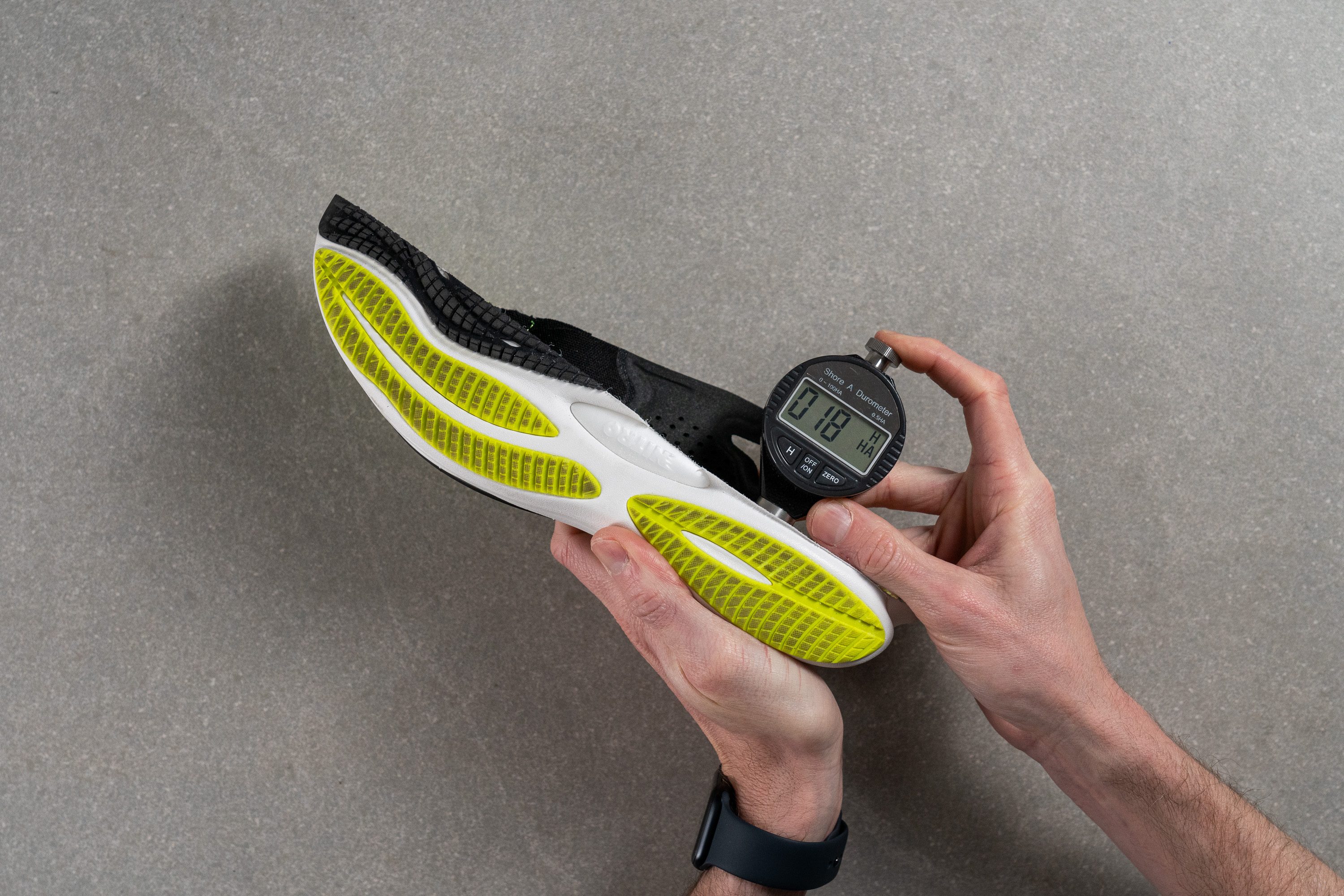
| Velocity Nitro 3 | 17.9 HA |
| Average | 20.4 HA |
Secondary foam softness
The layer of secondary foam, positioned nearer to the ground, is a notably firm EVA, which we measured at 36.0 HA.
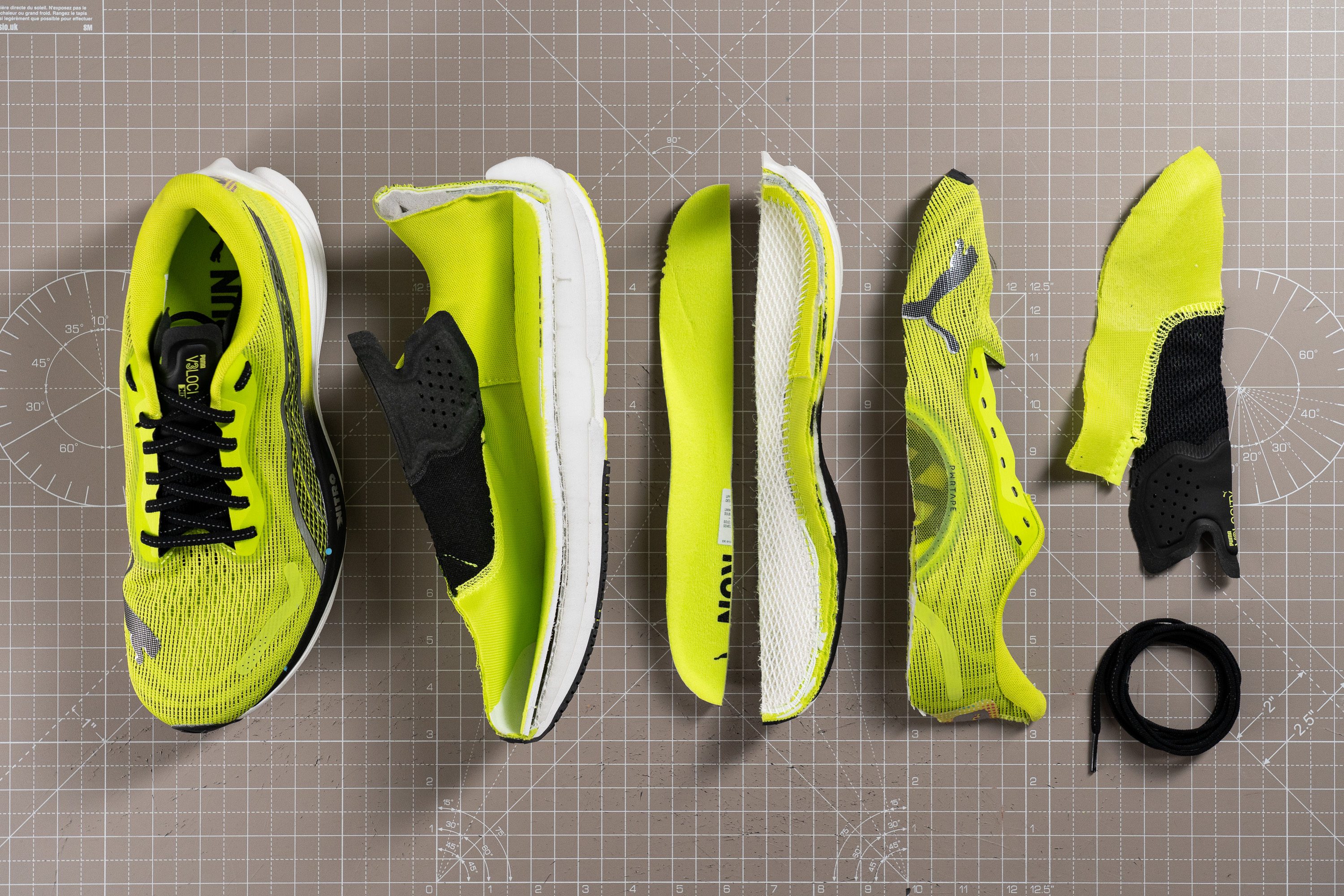
Its purpose is to enhance both durability and stability, effectively insulating the Nitro midsole from direct ground contact. However, it falls short in energy return and somewhat mutes the ride. Therefore, for the next iteration of the Velocity Nitro, we would prefer a full layer of Nitro foam.
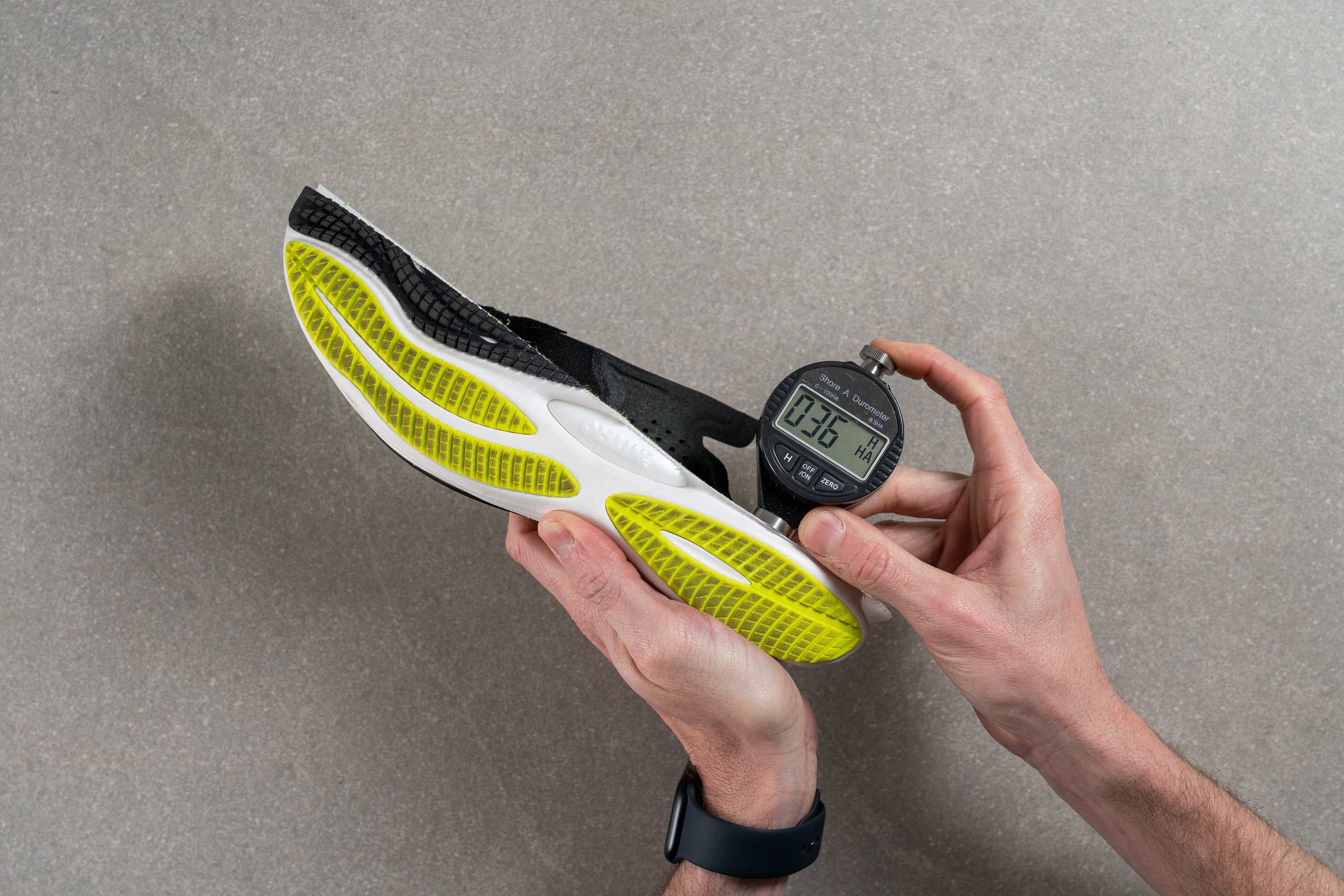
| Velocity Nitro 3 | 36.0 HA |
| Average | 22.7 HA |
Size and fit
Size
PUMA Velocity Nitro 3 fits true to size (92 votes).
Internal length
| Velocity Nitro 3 | 271.7 mm |
| Average | 269.4 mm |
Width / Fit
Our gel mould, solidified in the freezer, measured 93.0 mm—a surprisingly narrow result for a daily trainer. PUMA, known for its snug-fitting uppers, provides minimal room for runners with wider feet.
Based on our findings, the Velocity Nitro is better suited for runners with narrow or average feet.
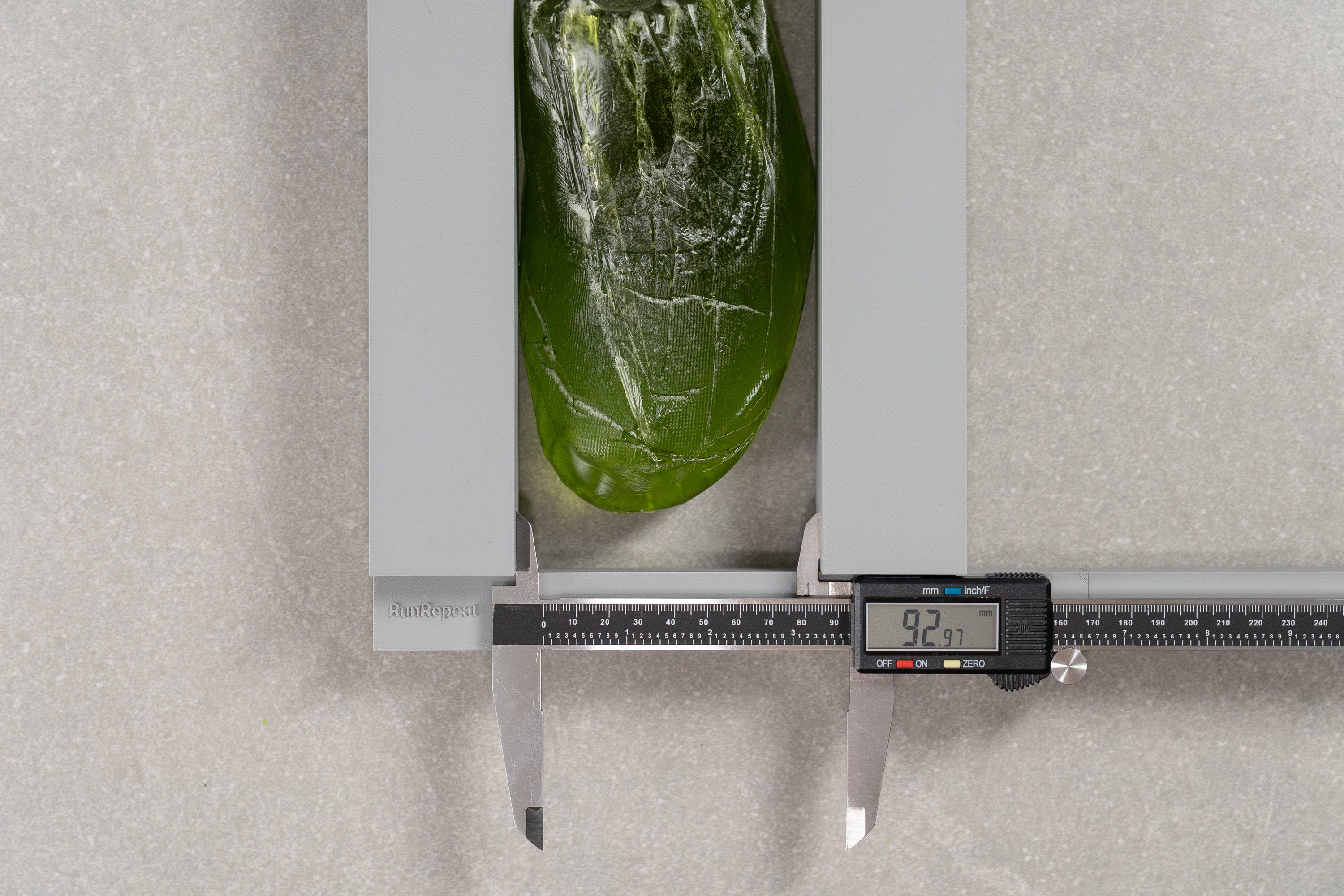
| Velocity Nitro 3 | 93.0 mm |
| Average | 95.1 mm |
Toebox width
When we unboxed the Velocity Nitro 3, we had no doubts about its snug fit. Even before running, it was clear that the toebox wasn’t toe-splay-friendly, with its tapered contour. After measuring, we found just 70.4 mm, which is definitely on the narrower side of things.
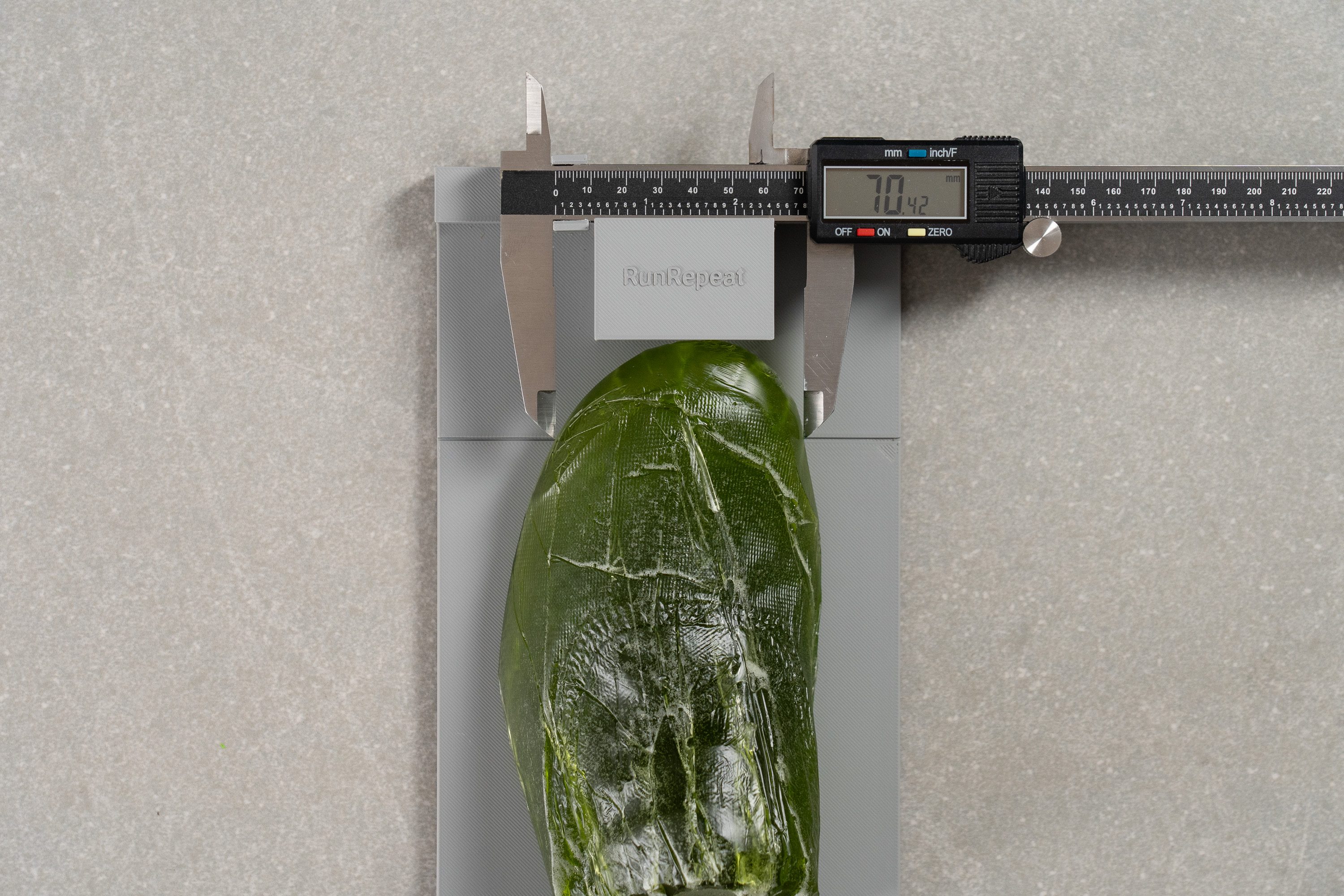
| Velocity Nitro 3 | 70.4 mm |
| Average | 73.3 mm |
Toebox height
It seems PUMA aimed to minimise material in the toebox, as the upper height is quite limited at just 25.7 mm. Of course, this makes it an excellent daily trainer for runners with low-volume, narrow feet.
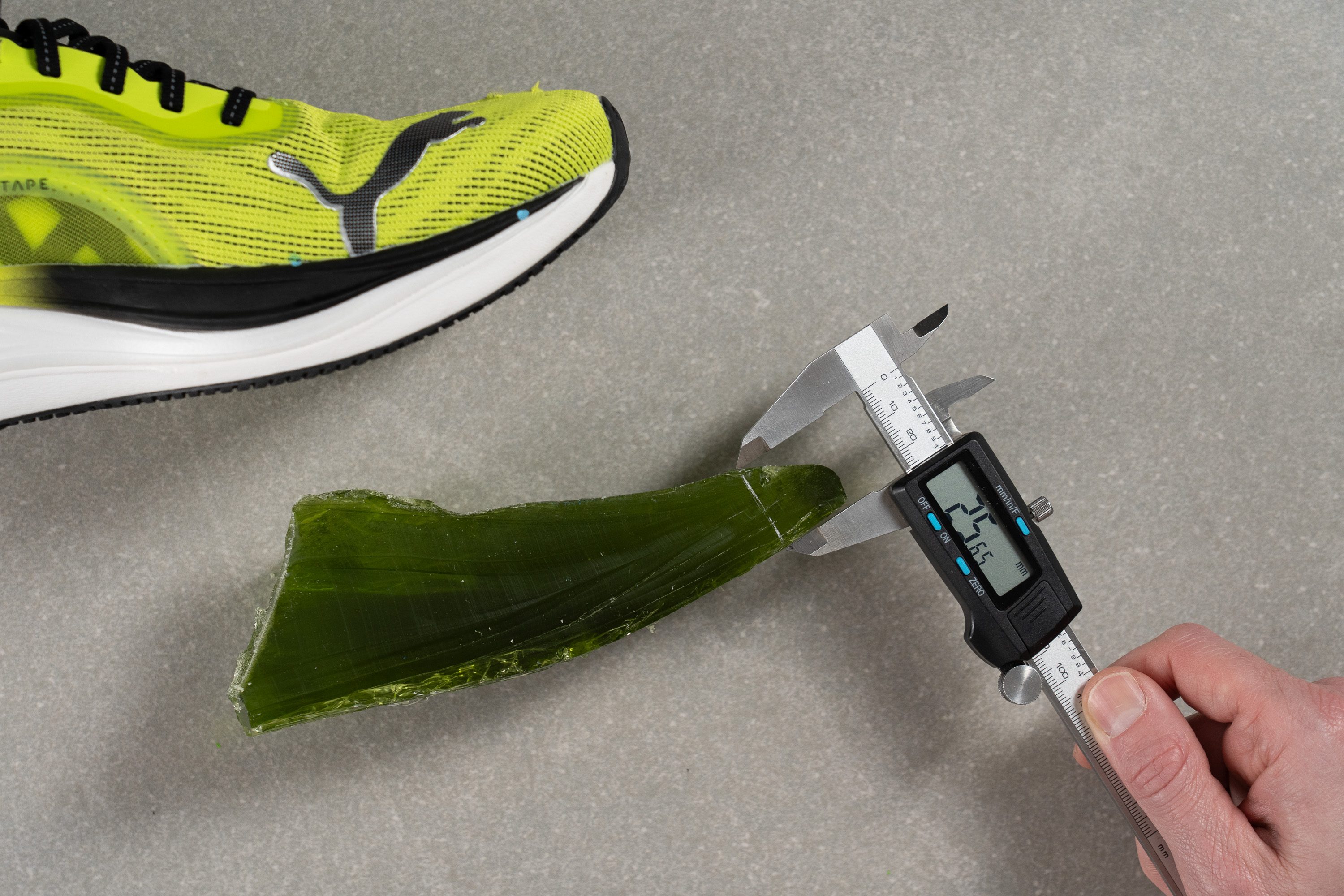
| Velocity Nitro 3 | 25.7 mm |
| Average | 27.0 mm |
Traction / Grip
Traction test
One of the standout qualities of PumaGrip is that it brings consistent grip even to more budget-friendly models. We tested the Velocity Nitro 3 in the lab and recorded the same 0.60 result as the higher-priced MagMax Nitro.
And what does that lab score mean? Expect high-confidence traction on wet pavement and total control in dry conditions.
| Velocity Nitro 3 | 0.60 |
| Average | 0.49 |
Outsole design
This outsole features full-length PumaGrip with a generous blend of black and yellow rubber segments, delivering awesome traction across the heel and forefoot. The forefoot grooves also add a bit of flexibility without sacrificing durability.
Compared to many modern daily trainers, this outsole stands out with its almost full coverage and an ultra-grippy compound.
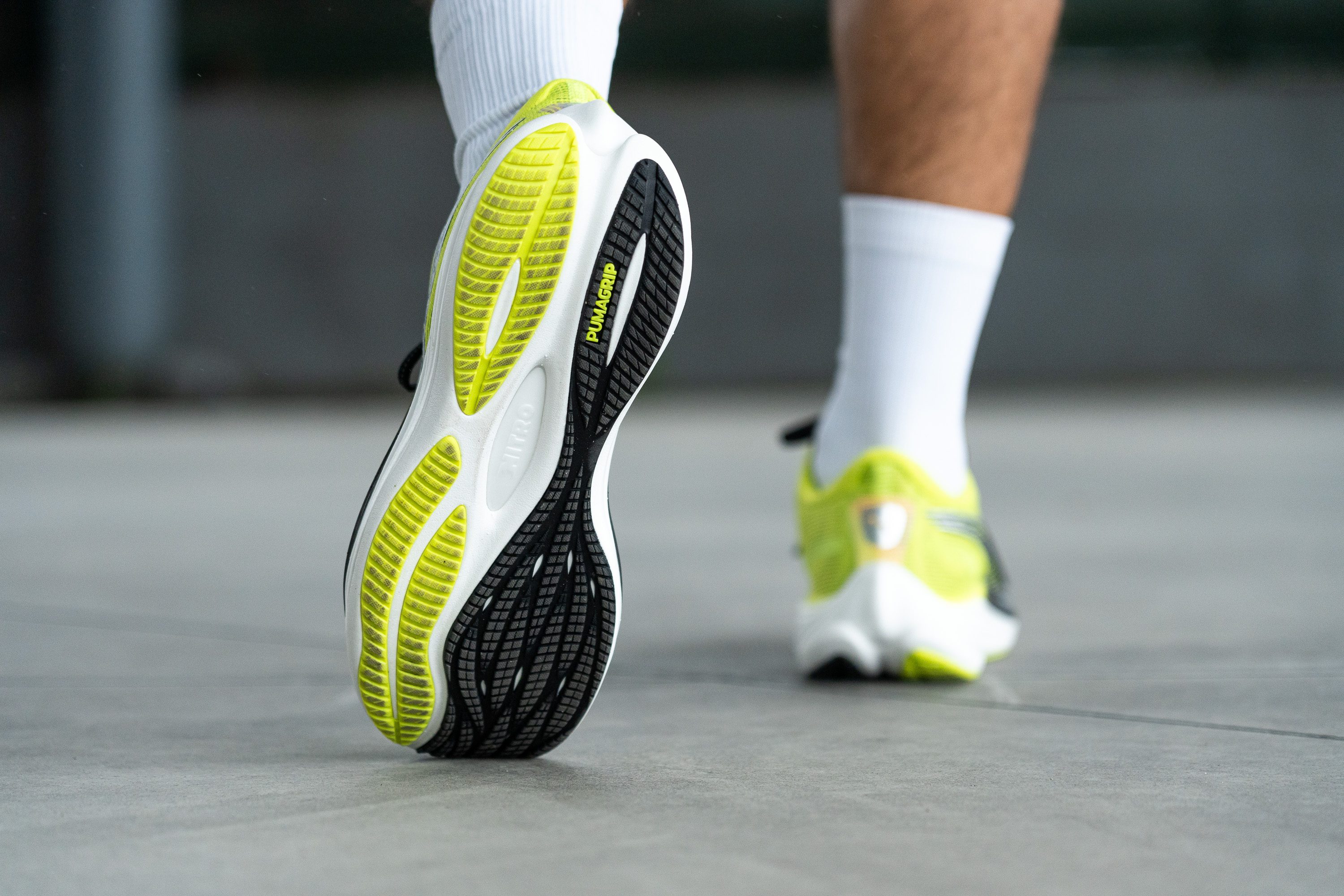
Flexibility / Stiffness
Once we completed those measurements, we transitioned to another section of our lab to evaluate the shoe's stiffness using our custom-made machine.
The outcome was 14.8N, aligning with our expectations for a daily running shoe that aims for a middle ground, avoiding the extremes. We can affirm that running in this shoe feels natural, partly due to the absence of a rockered geometry. Additionally, it's versatile enough for other activities such as walking or gym workouts.
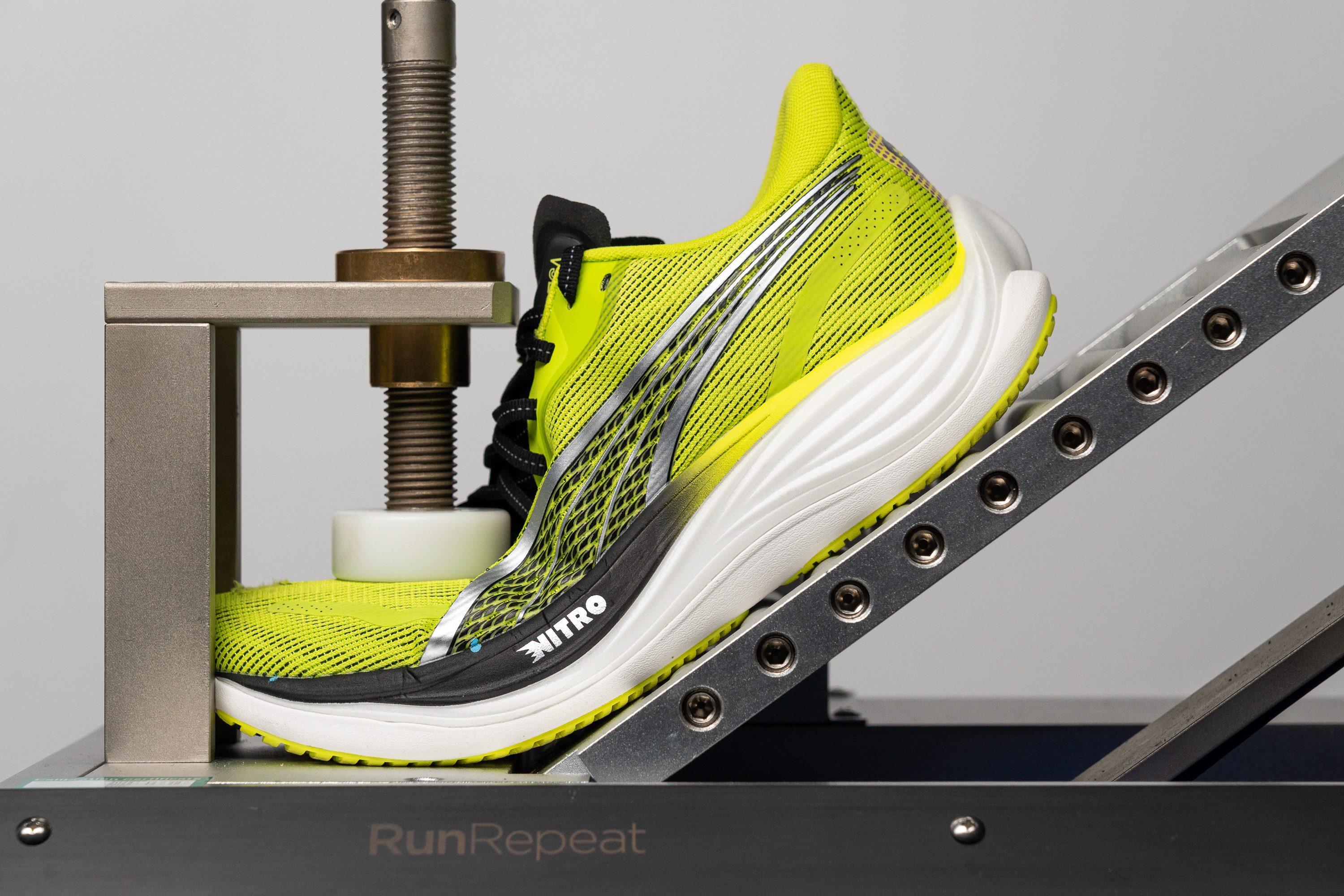
| Velocity Nitro 3 | 14.8N |
| Average | 15.3N |
Weight
The insole is non glued, allowing for easy replacement. Given its thickness, those requiring additional vertical space in the upper might consider swapping it out for a slimmer one.
Weight
Right from our initial steps, we sensed that this shoe leaned towards the lighter end of the spectrum, a feeling that was later confirmed by the scale.
Weighing in at 9.3 oz or 264g, this is an impressively low figure for a daily trainer, especially one as durable and with a moderately high stack height as this. Puma has indeed done a great job here.
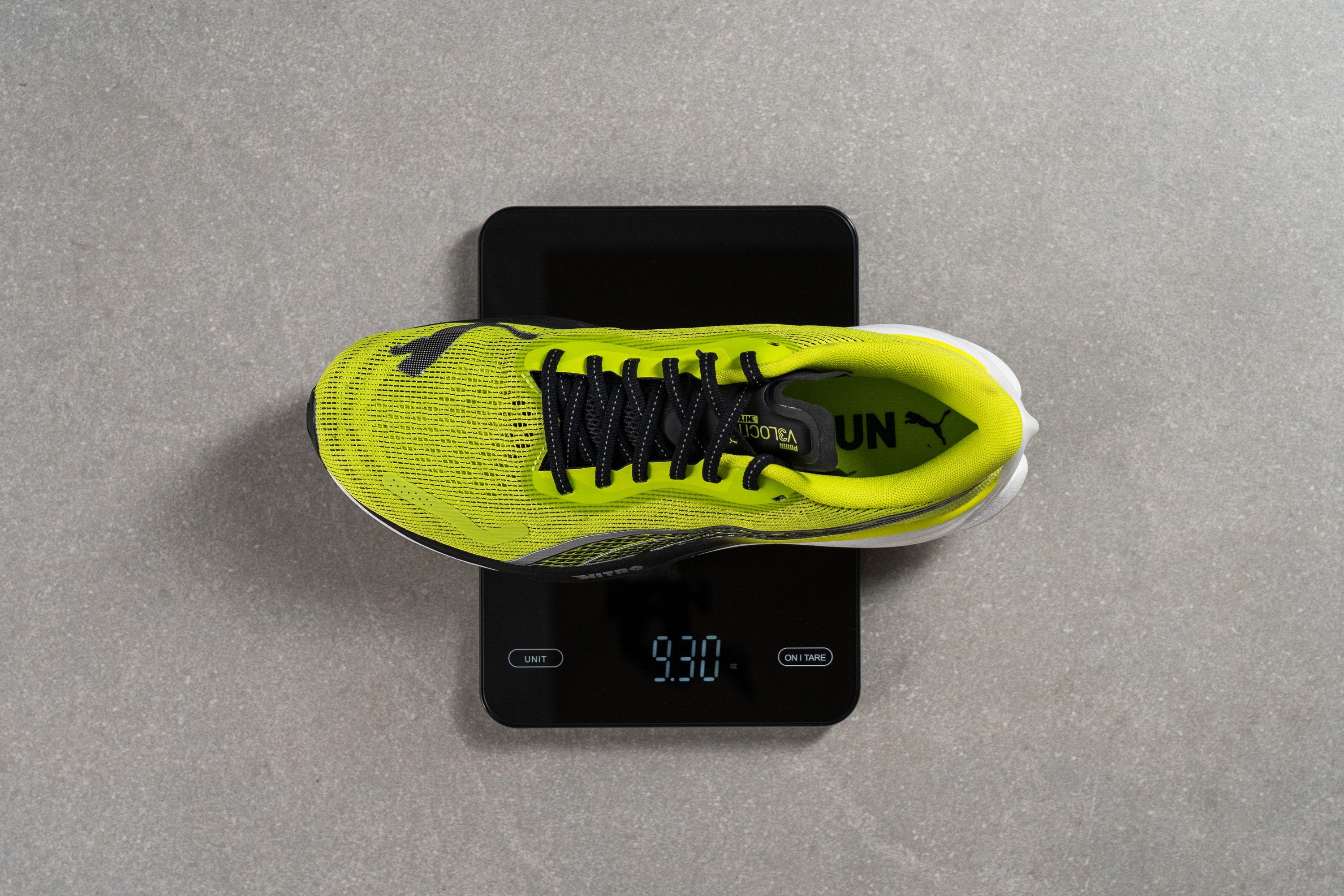
| Velocity Nitro 3 | 9.3 oz (264g) |
| Average | 9.3 oz (264g) |
Breathability
Our initial focus on the Velocity Nitro 3 was its breathability—a crucial aspect for an all-rounder. Thankfully, our findings were positive, with the smoke test in the lab yielding a 4/5 score. That's impressive!
However, it's worth noting that not the entire upper boasts such good ventilation. The breathability is primarily in the toebox, while the medial part remains densely constructed, a deliberate choice to enhance stability, albeit at the expense of airflow. The light test proved to be the perfect method to highlight this, clearly showing the difference.
At a glance, the mesh didn't strike us as particularly extraordinary or groundbreaking. We decided to delve deeper with a microscopic examination to verify our initial impressions.
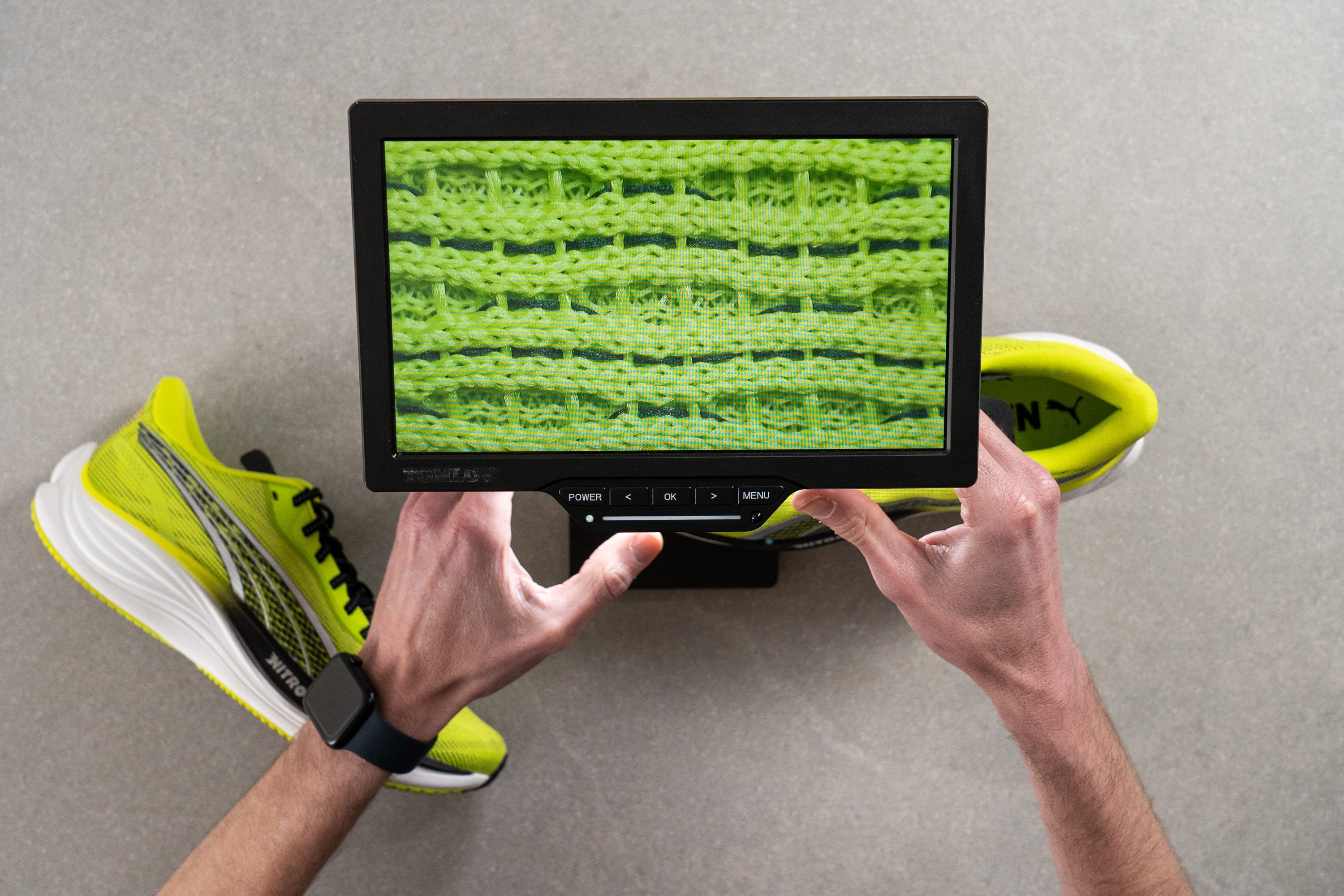
What we discovered confirmed our thoughts—it's a straightforward engineered mesh, devoid of any fancy features, keeping costs down while still focusing on providing good breathability and durability. We've confirmed the former and will touch on the latter shortly.
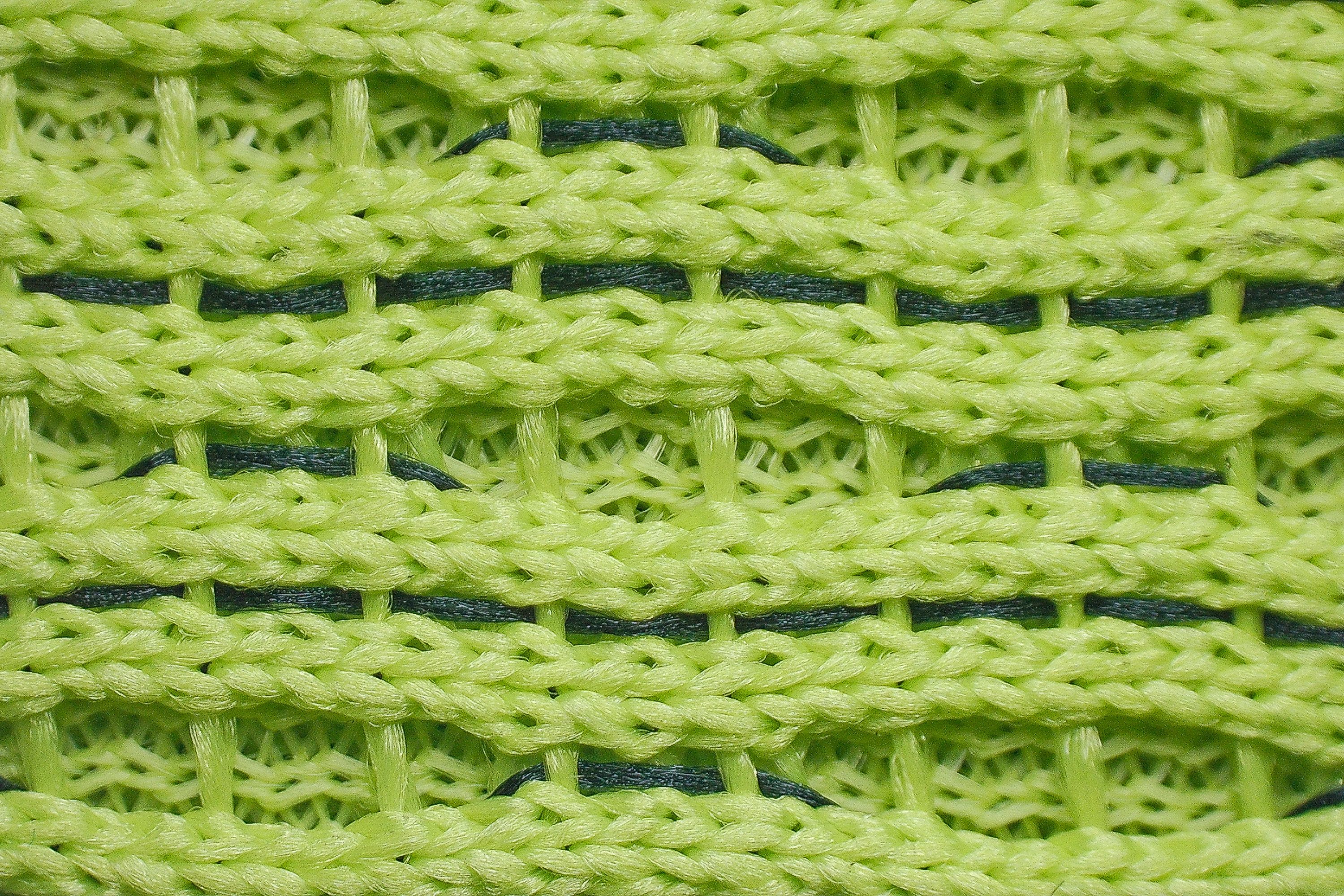
Upon a closer final inspection of the upper, we noticed it's not very stretchy.
Excluding the heel from this analysis, the padding is also less substantial compared to other daily trainers. This characteristic partially accounts for the lighter feel we experienced while testing the shoe.
| Velocity Nitro 3 | 4 |
| Average | 3.7 |
Stability
Lateral stability test
Turning our focus to stability—a key aspect many runners prioritise—we conducted many tests on the shoe.
Our findings suggest it's most suitable for neutral runners, though it may accommodate those with slight pronation issues. However, for such cases, we would lean towards recommending a more specialised option, like the Hoka Arahi 7.
Torsional rigidity
As a daily trainer, the Velocity Nitro 3 turned out to be stiffer than anticipated, scoring a 3/5 in our rigidity test—whereas many of its rivals typically fall into the 1/5 or 2/5 range.
This rigidity directly contributes to the impressive stability we experienced with a neutral running style. However, it does compromise comfort during relaxed paces, a trade-off that merits attention.
| Velocity Nitro 3 | 3 |
| Average | 3.5 |
Heel counter stiffness
In our stiffness test, the heel counter of the shoe achieved a 3/5, adopting a balanced approach that avoids the overly soft feel of many competition shoes, yet stays clear of the rigid, stone-like feel characteristic of some stability footwear. We like this approach for a daily running shoe!
| Velocity Nitro 3 | 3 |
| Average | 2.9 |
Midsole width - forefoot
Upon taking precise measurements of the shoe, we were taken aback by its narrowness, which isn't immediately apparent at first glance.
The forefoot measured only 107.7 mm in width, which is notably narrower compared to similar models on the market. This unexpected measurement sheds light on Puma's decision to incorporate additional stability features, such as the firmer EVA carrier foam at the base of the midsole, to enhance the shoe's overall stability and performance.
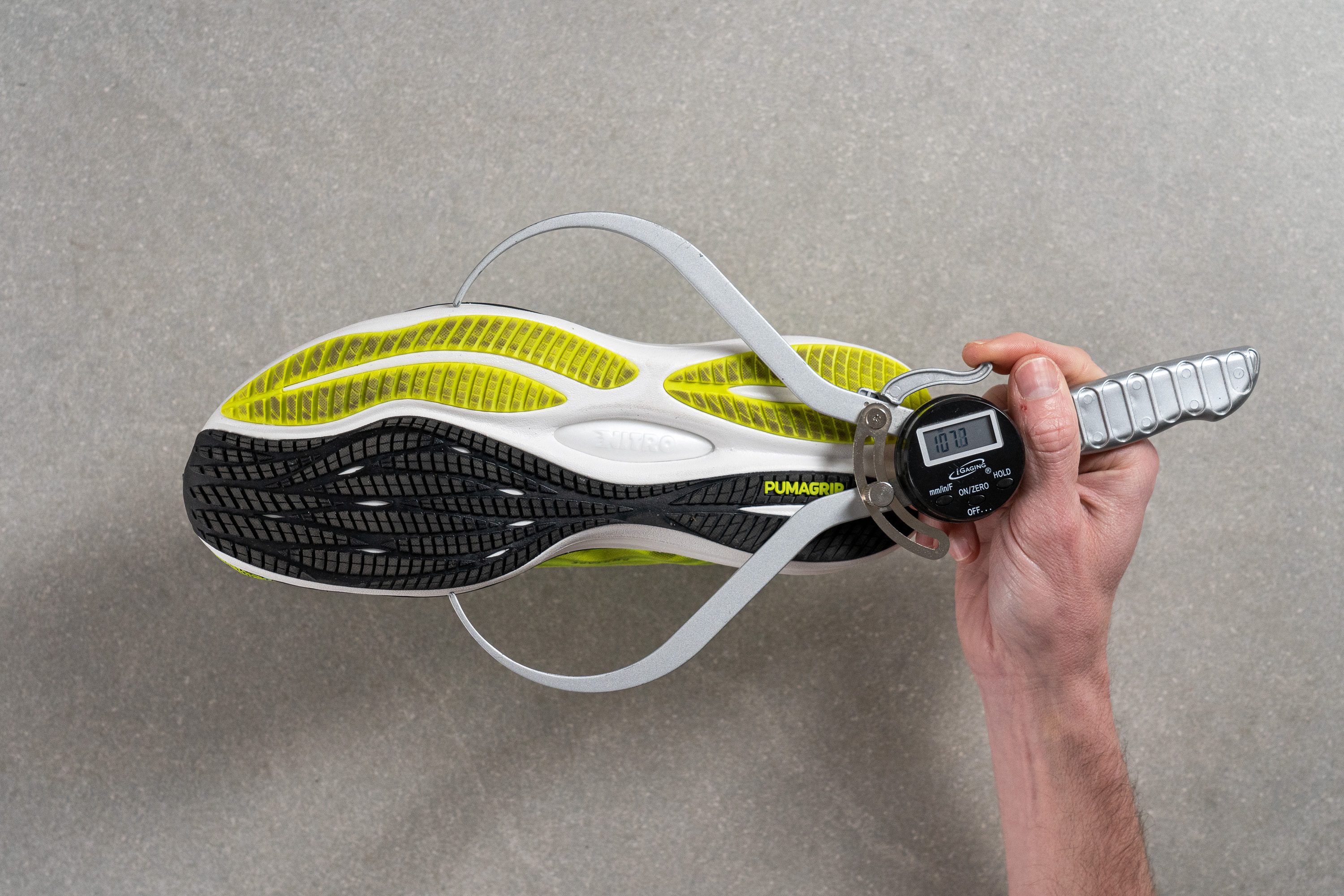
| Velocity Nitro 3 | 107.7 mm |
| Average | 114.4 mm |
Midsole width - heel
Measuring the heel at 89.8 mm, we found it to be slightly wider relative to the average shoe, considering the forefoot dimensions, yet it still trends towards the narrower side.
This design choice positions the shoe as an ideal pick for those who appreciate a sleek, traditional daily trainer, steering clear of the bulkier, maximalist designs that are becoming increasingly common among brands.
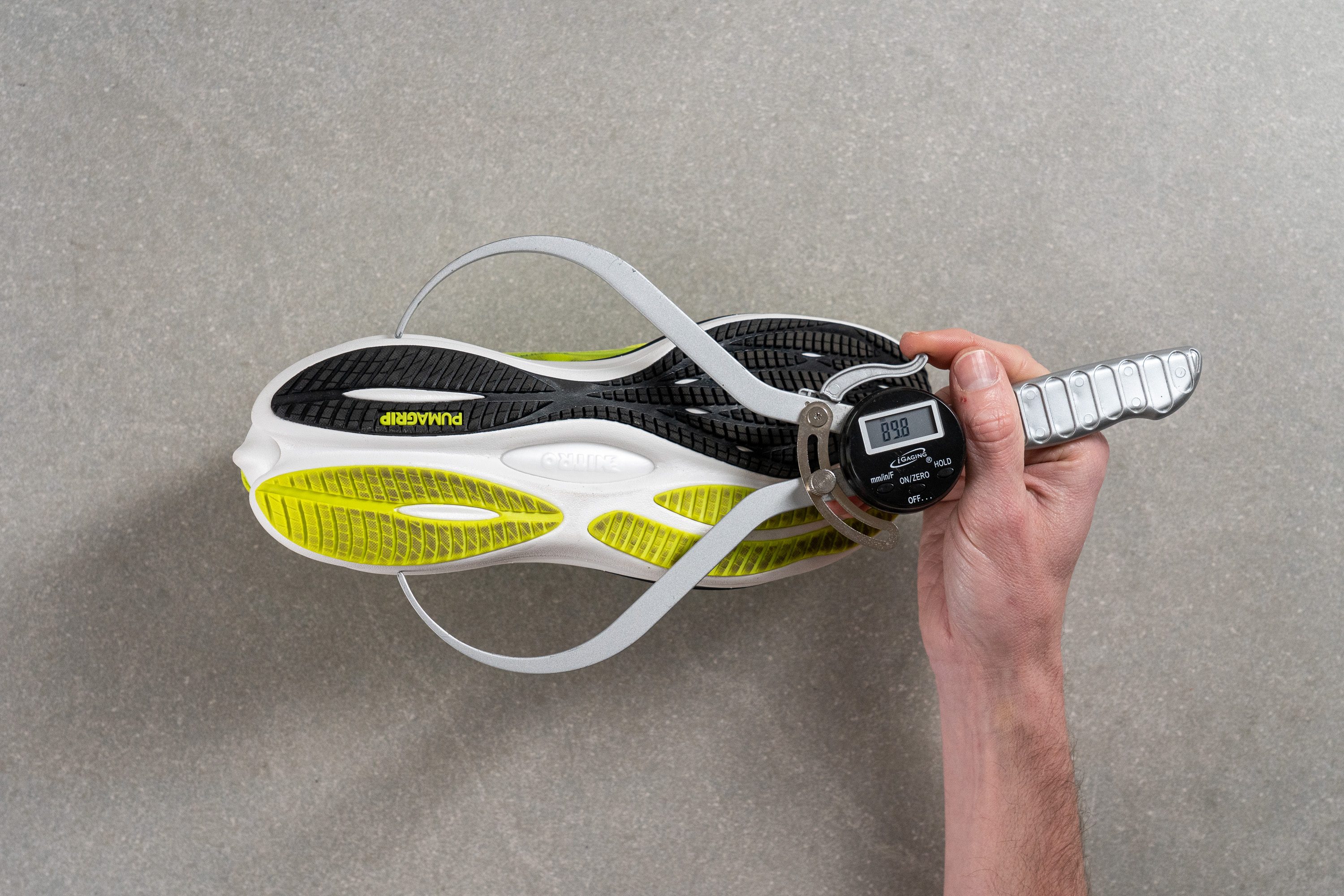
| Velocity Nitro 3 | 89.8 mm |
| Average | 90.6 mm |
Durability
Toebox durability
Heading into the Dremel zone of our lab, we were cautiously optimistic due to the shoe's absence of large ventilation holes—often a precursor to strong performance in this test.
Following the Dremel's work, we were delighted to discover a score of 3/5. This result is notably impressive, clearly outperforming the average running shoe.
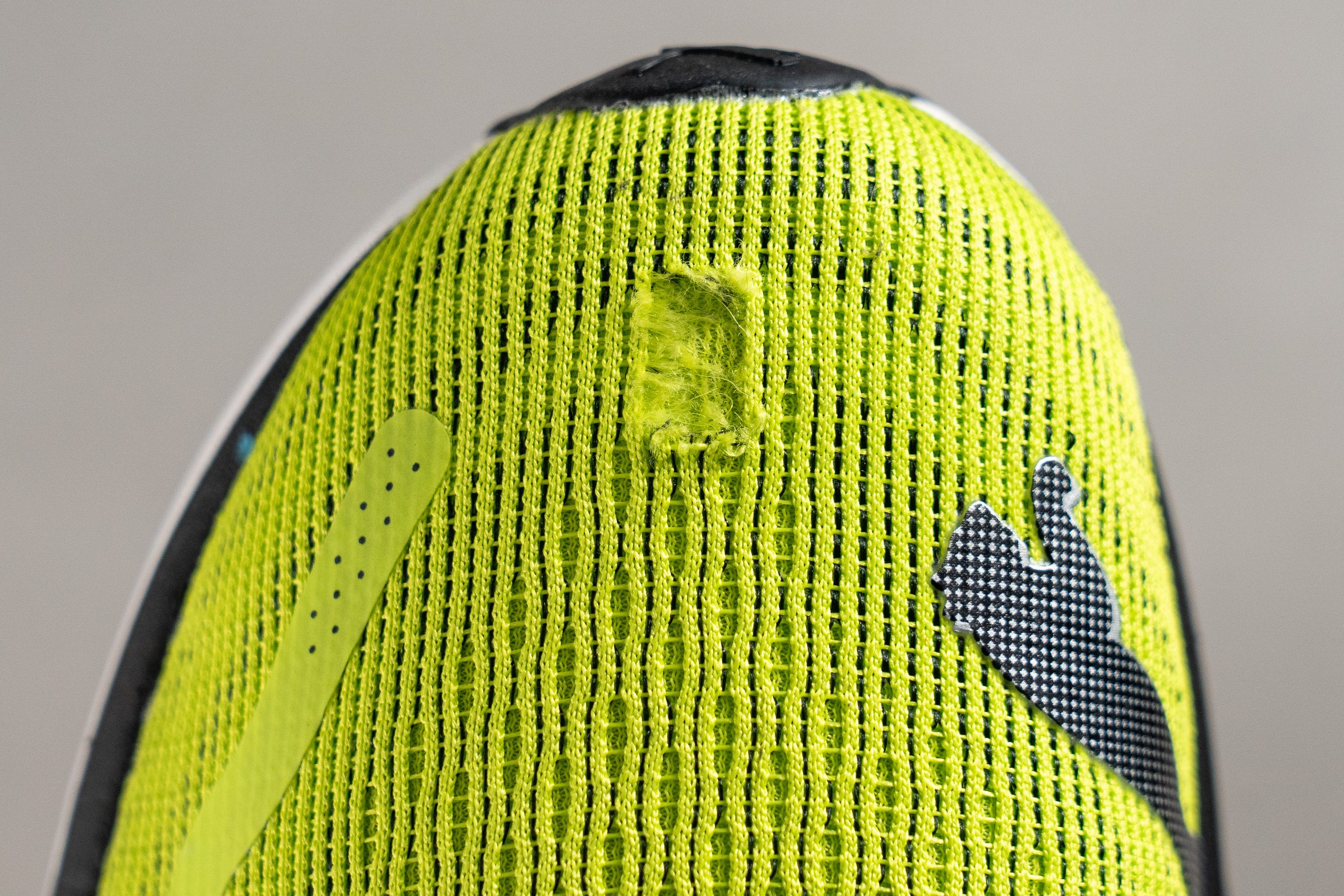
| Velocity Nitro 3 | 3 |
| Average | 2.6 |
Heel padding durability
Next, we shifted our focus to the heel padding—a critical aspect for assessing durability in running shoes.
In this area, Puma again stepped up its game, earning a 4/5 score. This performance notably exceeds that of many other shoes that we have tested in the lab.
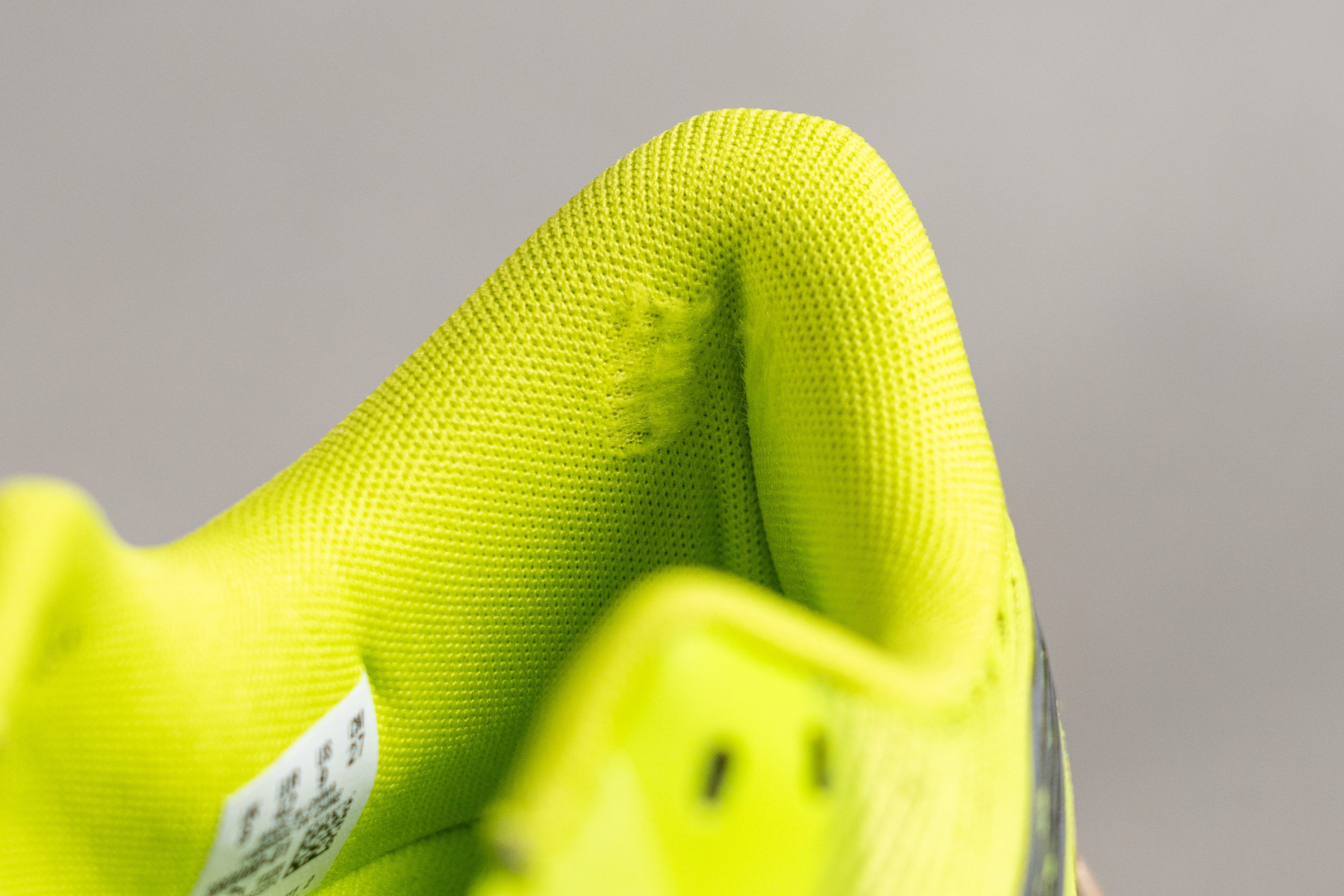
| Velocity Nitro 3 | 4 |
| Average | 3.4 |
Outsole hardness
Coming from the impressive results of the upper, we proceeded to examine the outsole, where we encountered the standout feature of the Velocity Nitro 3—the PumaGrip rubber compound.
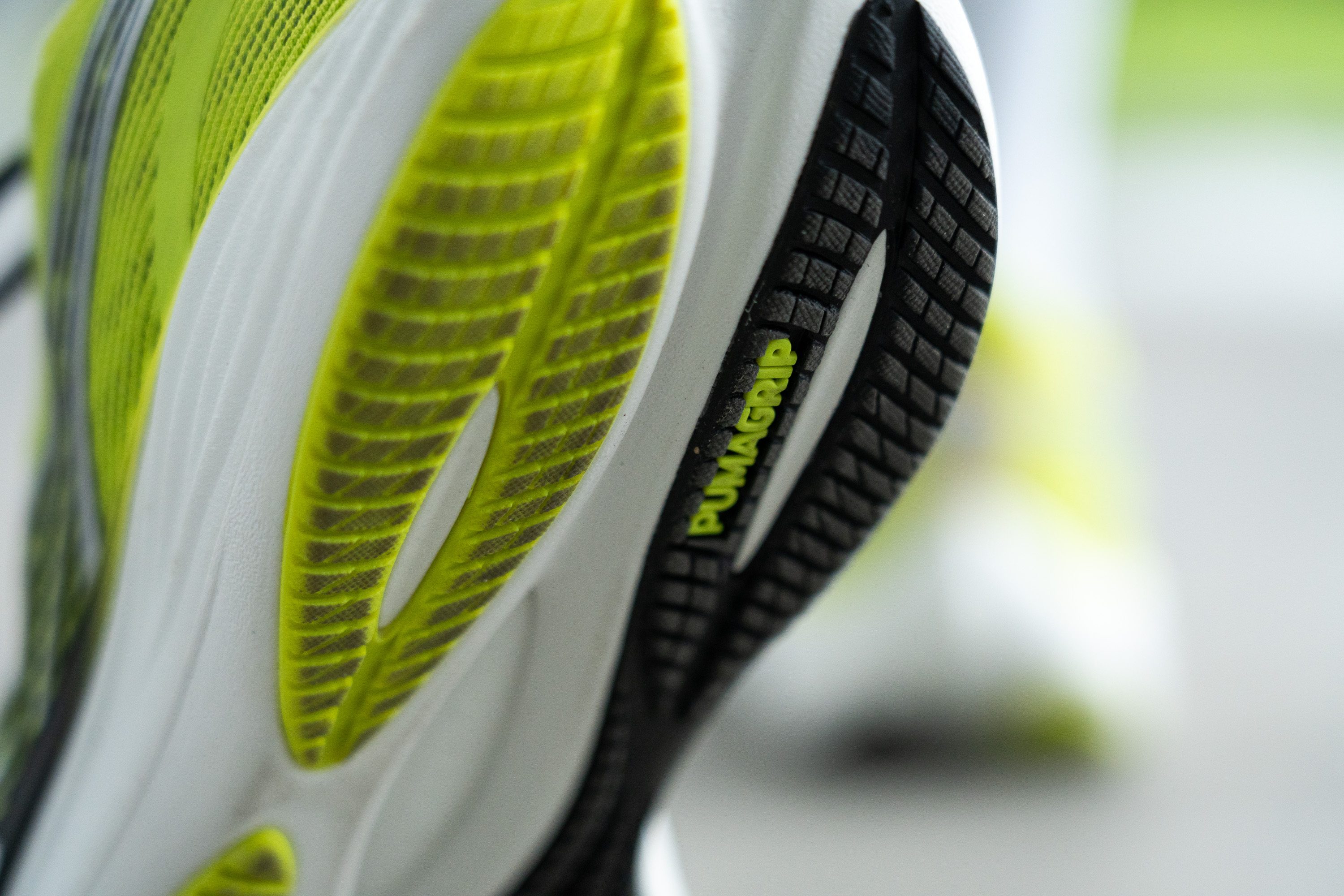
PumaGrip has a solid reputation in the running community for being one of the most effective grips on the market, and our tests affirm its top-notch performance in all kind of surfaces.
Yet, it's common knowledge that increased grip often comes at the expense of durability. Could this be the case here? In our initial tests with the VN3, the durometer reading of 72.8 HC suggested a particularly soft rubber, hinting at the delicate balance Puma has struck between grip and longevity.
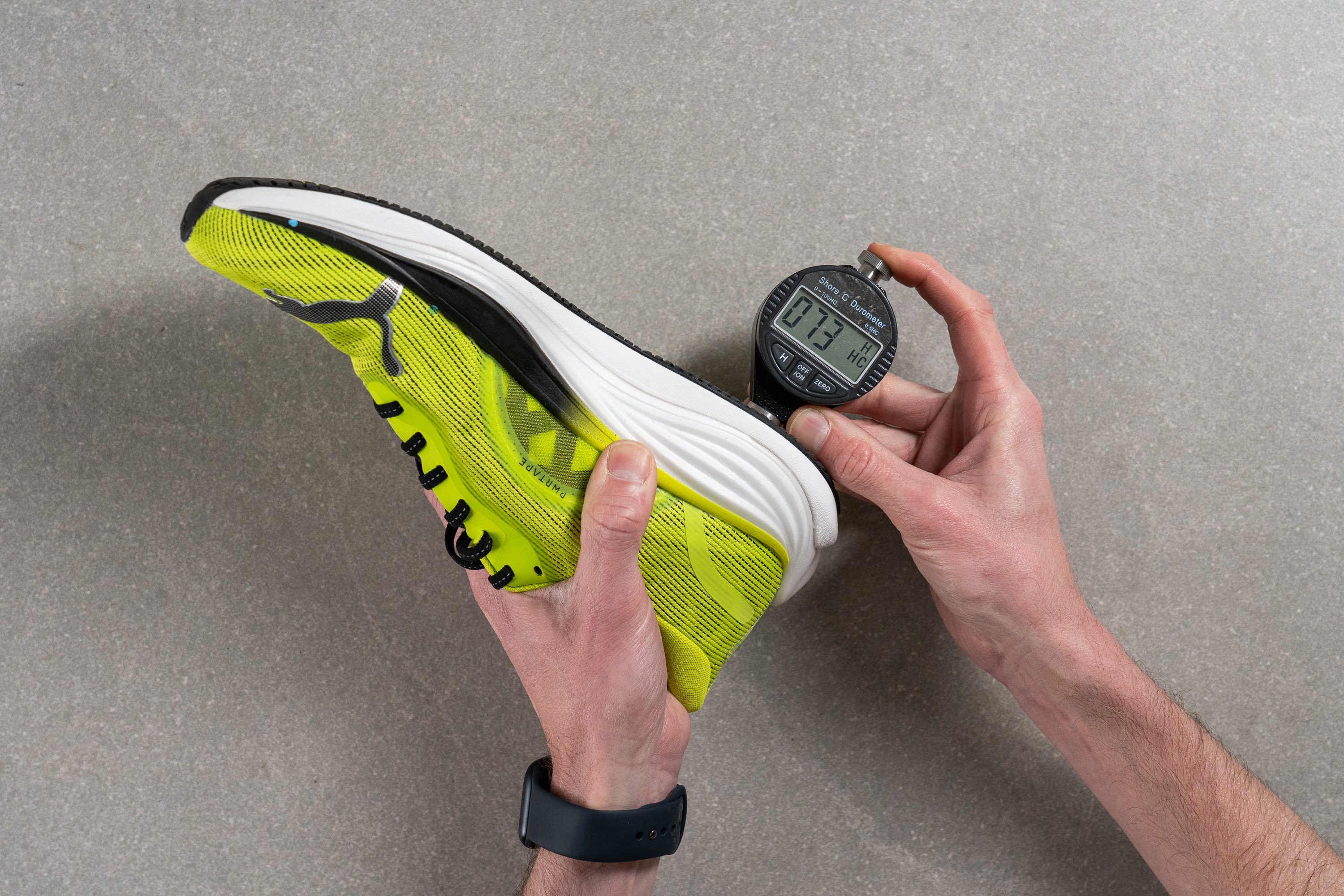
| Velocity Nitro 3 | 72.8 HC |
| Average | 79.2 HC |
Outsole durability
But a single measurement alone isn't conclusive without a proper wear test. This is why we deployed the Dremel for a third—and final—evaluation in our lab.
Following the application of the Dremel on the PumaGrip rubber, we observed a 1.0-mm indentation. While this might seem average at first glance, we consider it quite good, especially given the softness of the rubber.
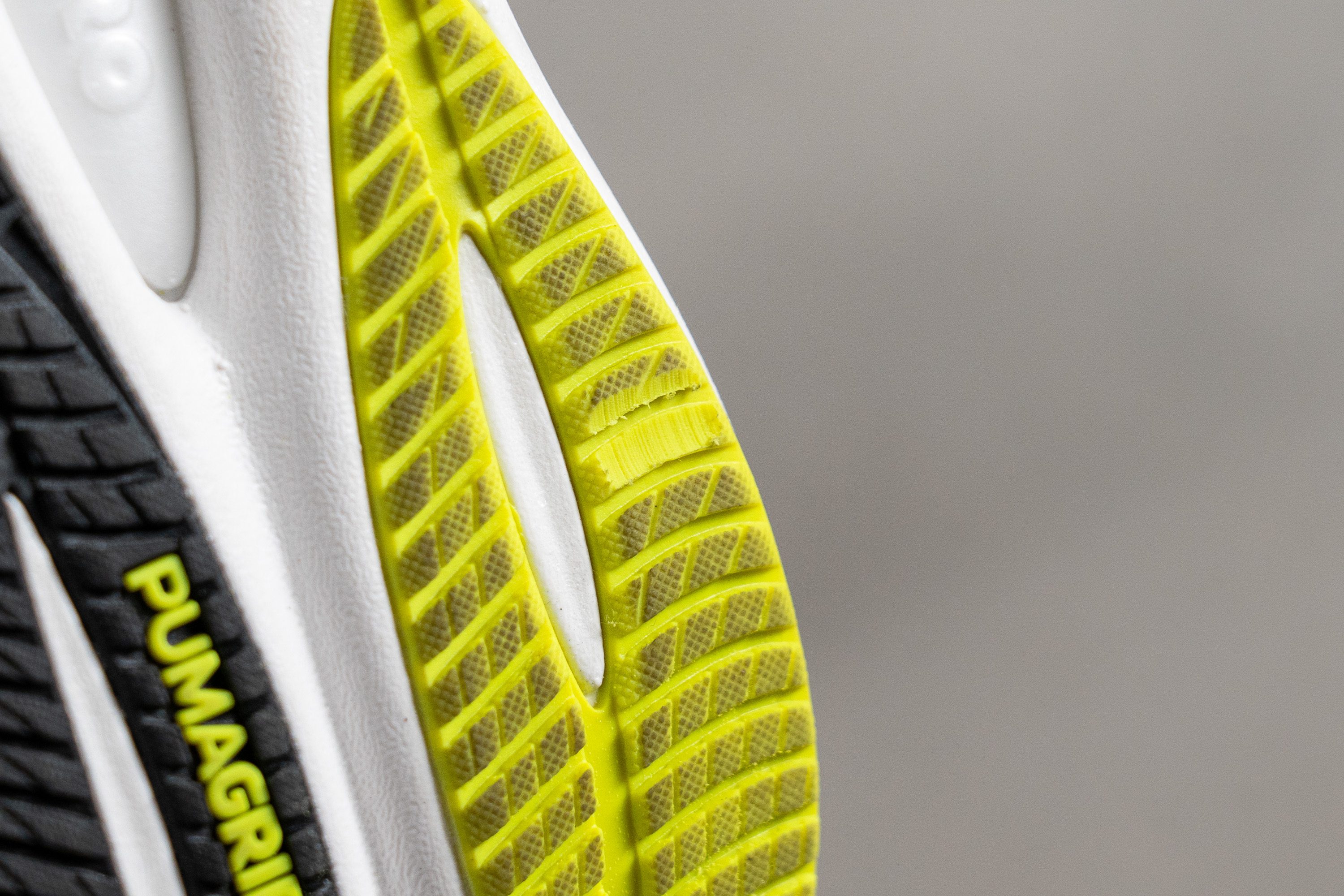
| Velocity Nitro 3 | 1.0 mm |
| Average | 1.1 mm |
Outsole thickness
In our final step, we measured the thickness of the Velocity Nitro 3's rubber using our vernier calliper, finding it to be 3.0 mm.
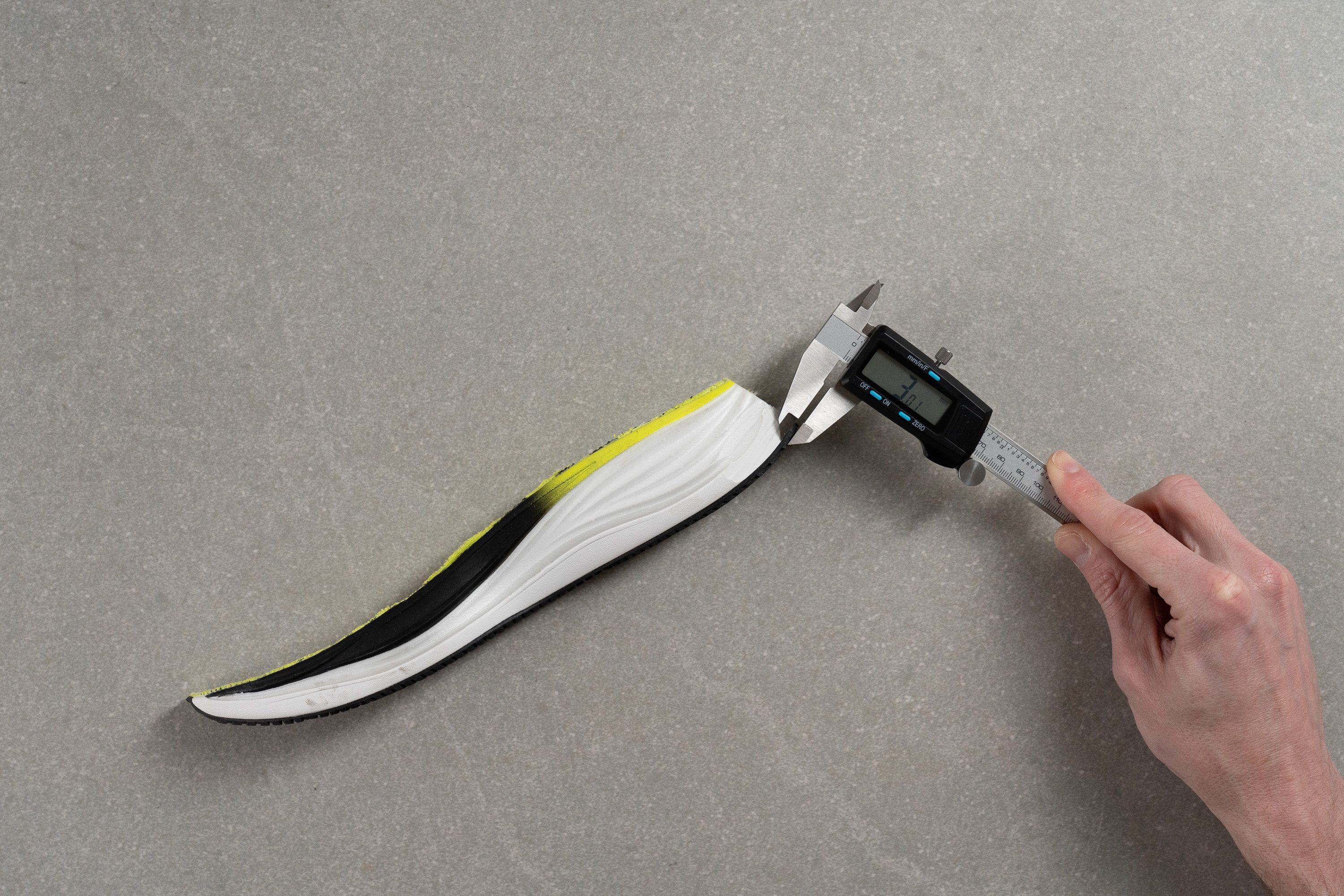
| Velocity Nitro 3 | 3.0 mm |
| Average | 3.2 mm |
Misc
Insole thickness
The insole boasts a substantial thickness of 5.9 mm, enhancing the shoe's comfort and providing a soft sensation underfoot.
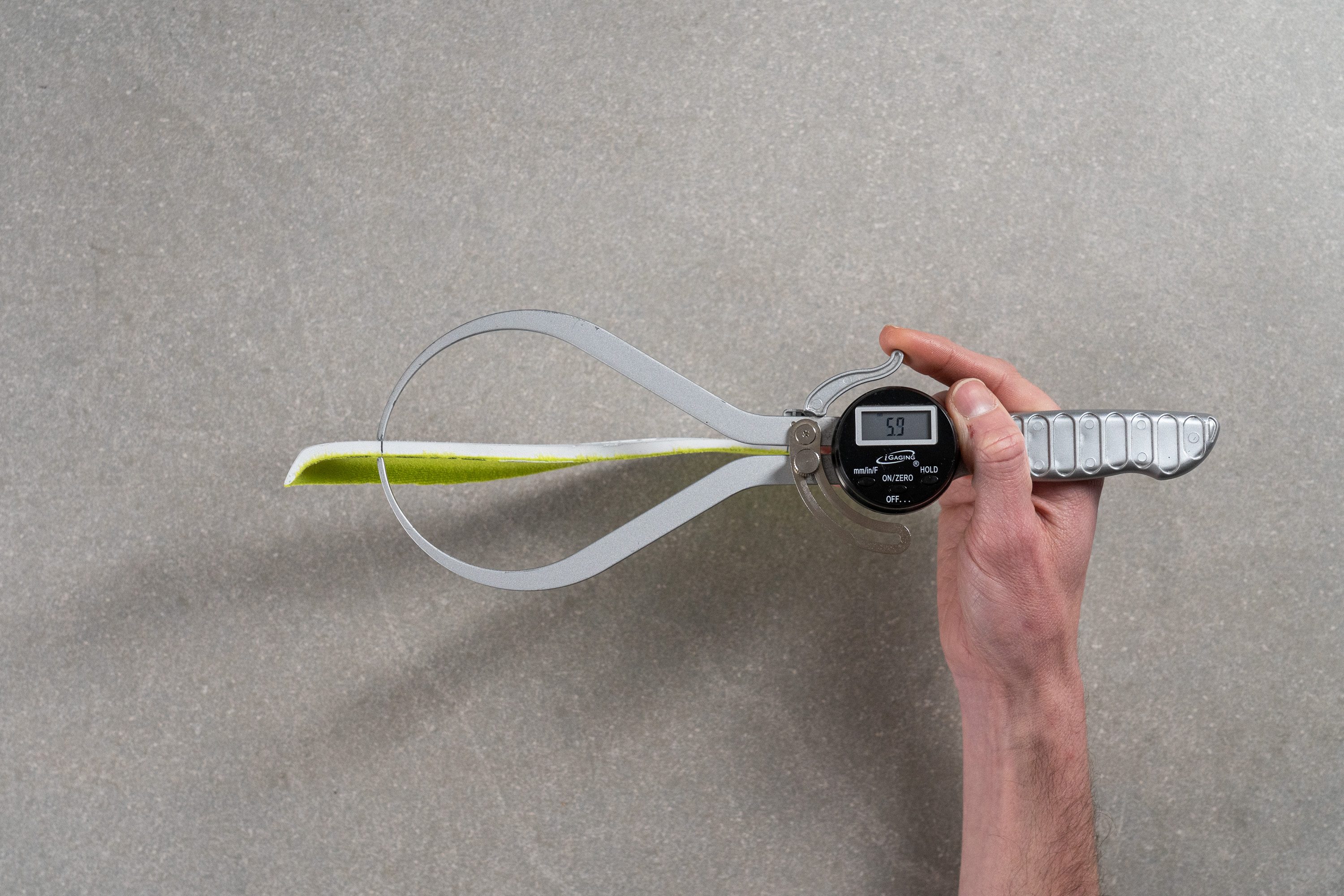
| Velocity Nitro 3 | 5.9 mm |
| Average | 4.5 mm |
Removable insole
The insole is non glued, allowing for easy replacement. Given its thickness, those requiring additional vertical space in the upper might consider swapping it out for a slimmer one.
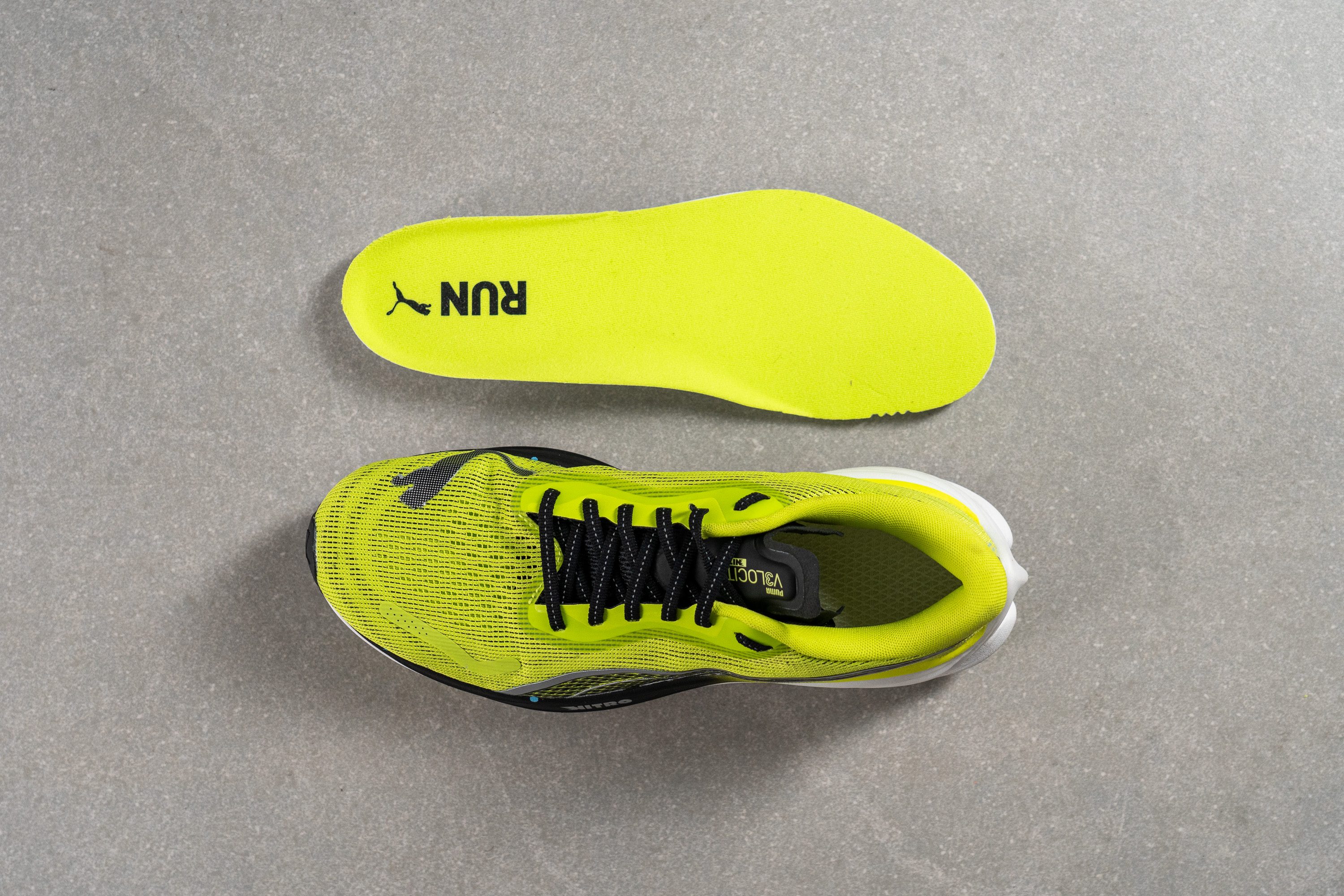
| Velocity Nitro 3 | Yes |
Midsole softness in cold (%)
To assess how the Nitro foam holds up in cold conditions, we placed the VN3 in the freezer for 20 minutes before re-evaluating its softness. We were thrilled to find that it only became 16.8% firmer—a remarkable performance that truly exceeded our expectations.
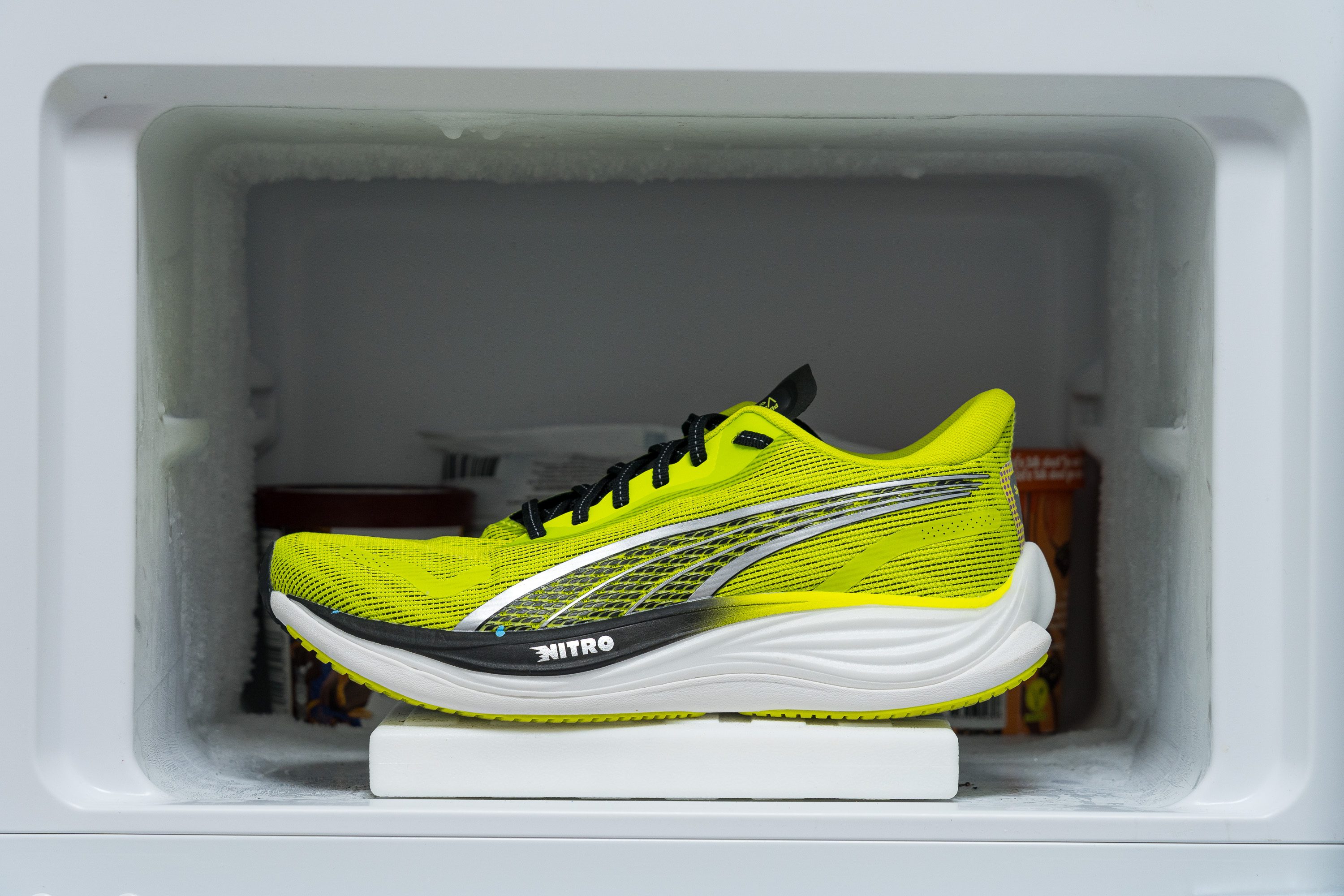
| Velocity Nitro 3 | 17% |
| Average | 24% |
Reflective elements
We were pleasantly surprised by the Velocity Nitro 3! In a world where many brands are moving away from reflective elements, it's refreshing to see this feature shine through.
Our testing revealed that this attention to detail really makes a big difference, especially for those late evening runs in winter!
| Velocity Nitro 3 | Yes |
Tongue padding
The tongue is thin, measuring a mere 3.2 mm, which falls short for those who favour a more cushioned and plush feel.
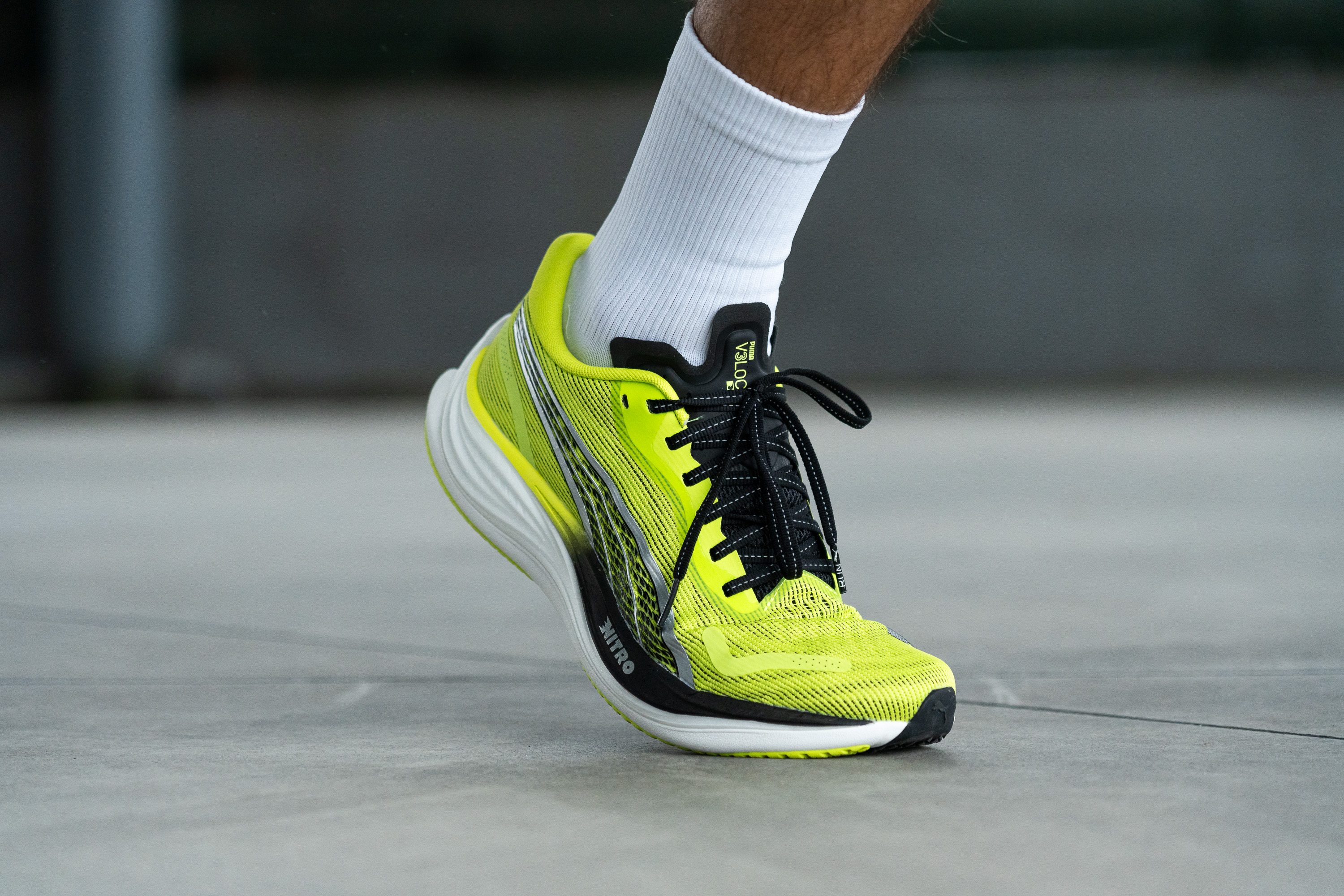
In our testing, we discovered that if you're seeking that extra padding under the laces, you might be better off with a shoe like the Adidas Supernova Rise. This model offers triple the padding for your instep, though it comes with the drawback of added weight.
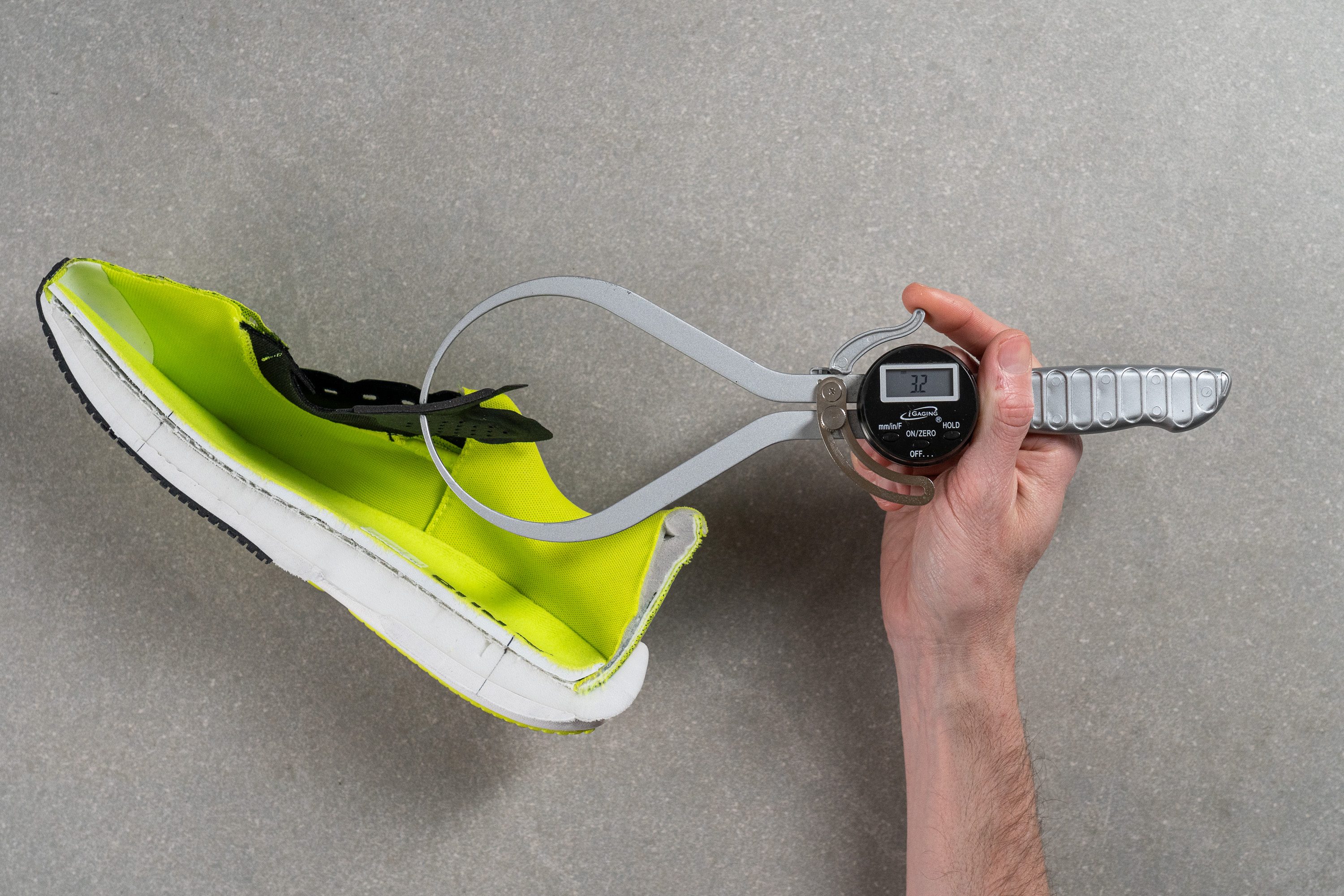
| Velocity Nitro 3 | 3.2 mm |
| Average | 5.7 mm |
Tongue: gusset type
A standout feature we've noted in the VN3, which isn't common in all daily trainers, is its gusseted tongue—a truly commendable addition for a £140 shoe.
We've observed that this design significantly enhances the lockdown by securing it to the sides, elevating the overall fit and comfort.
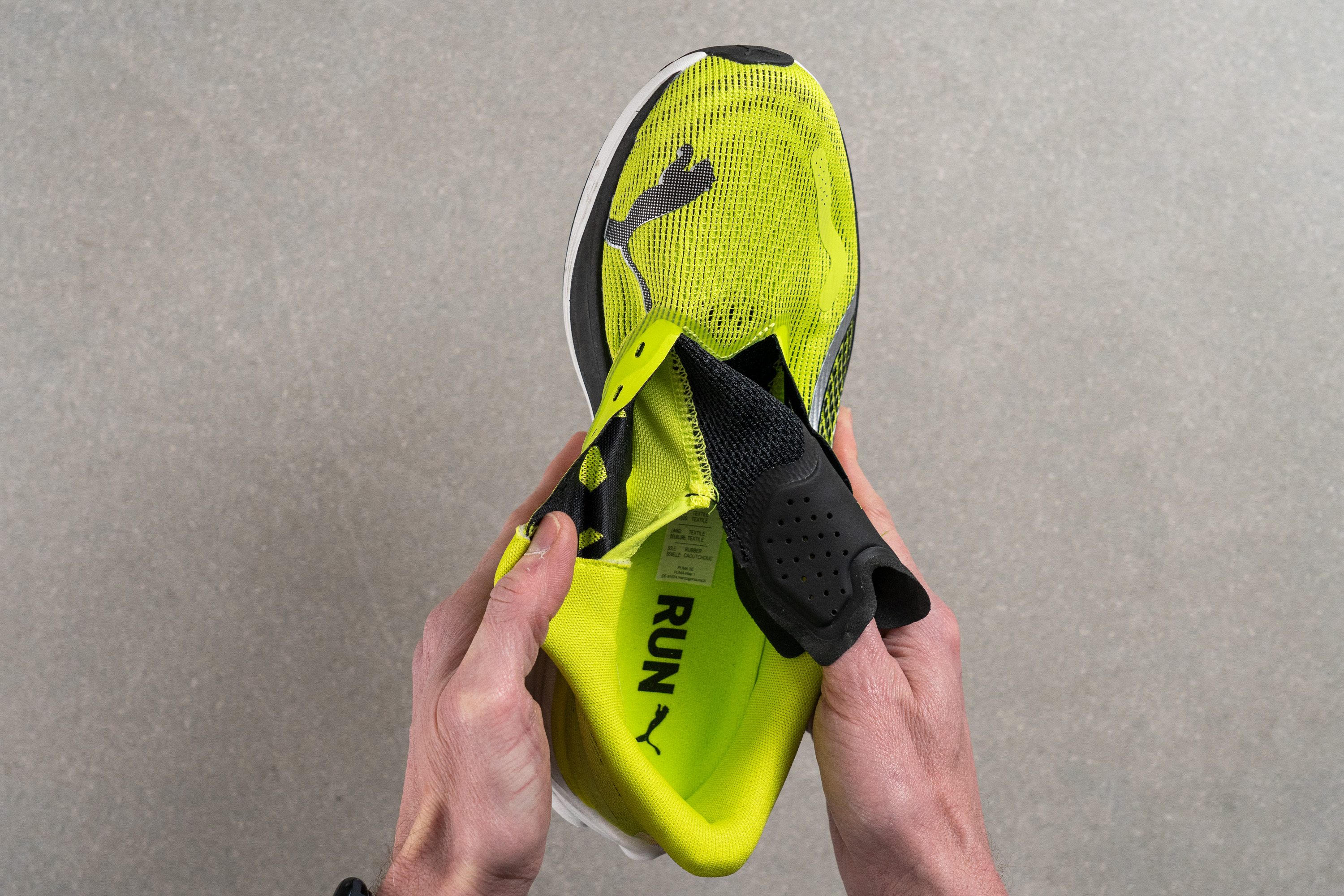
| Velocity Nitro 3 | Both sides (full) |
Heel tab
Although we didn't find a finger loop tab, there is a slightly extended heel collar that facilitates grabbing the shoe from that area, while also providing some relief for the Achilles tendon.
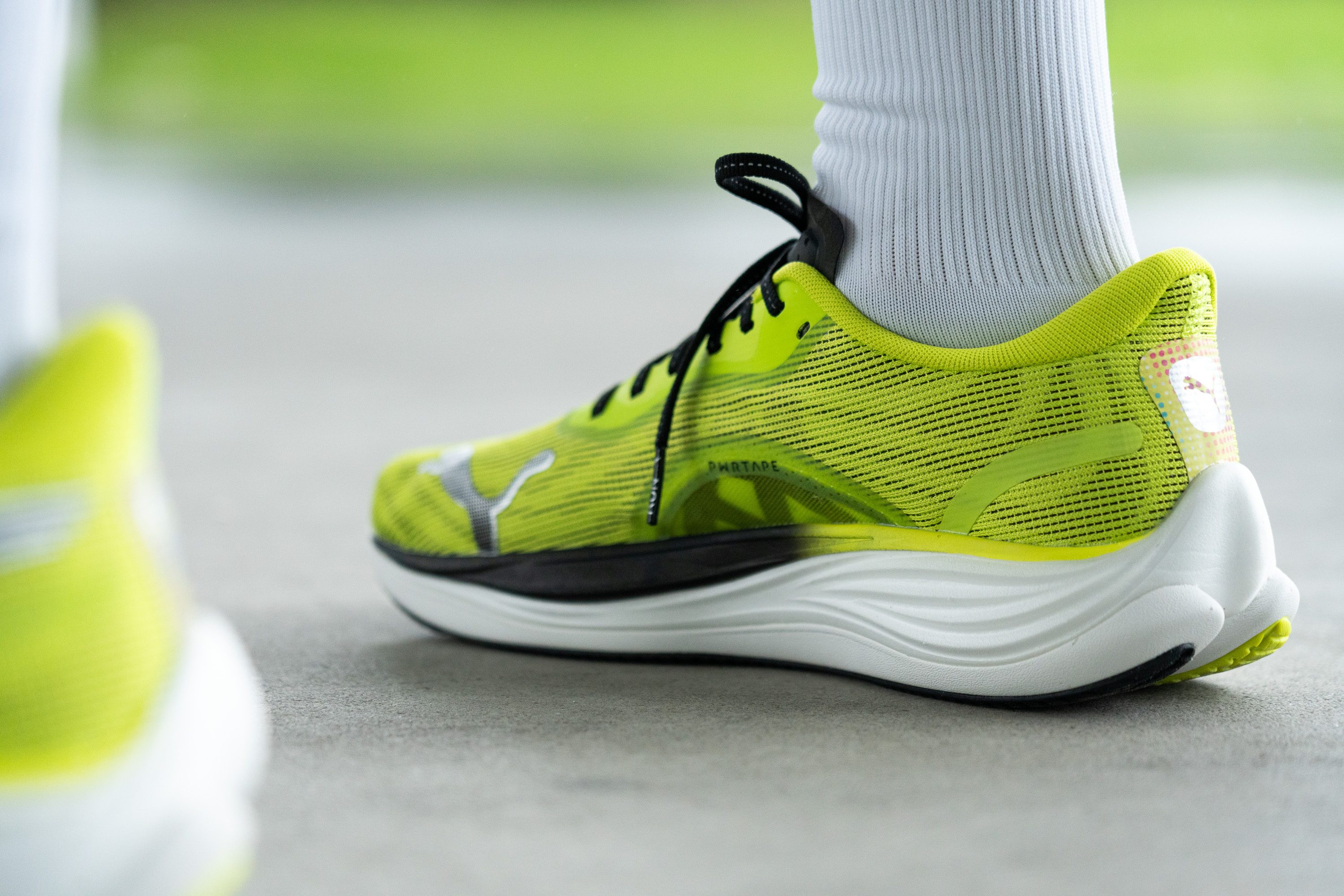
| Velocity Nitro 3 | Extended heel collar |

